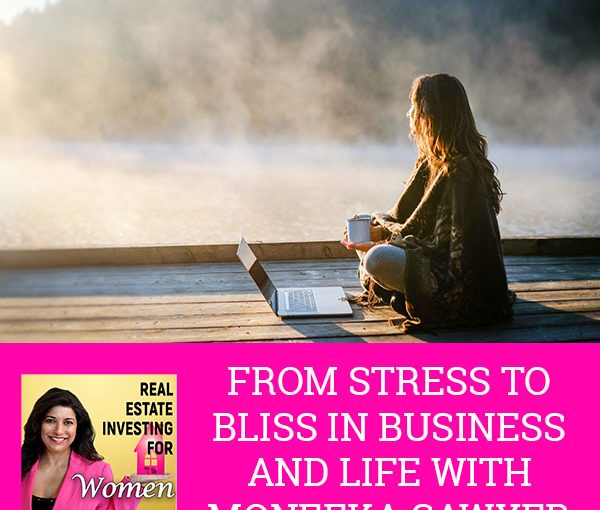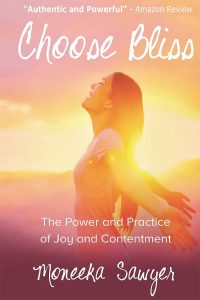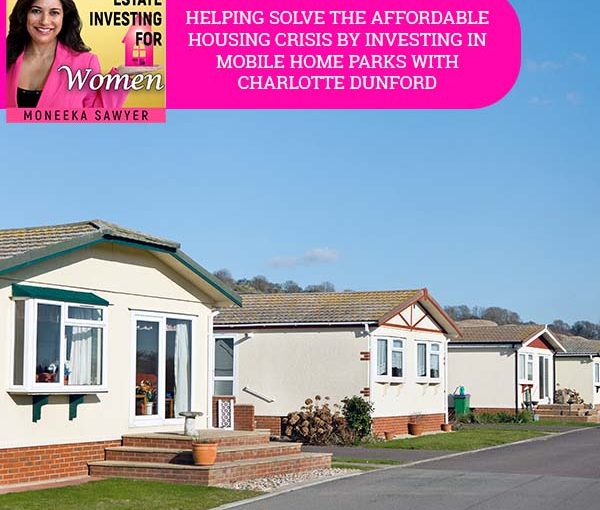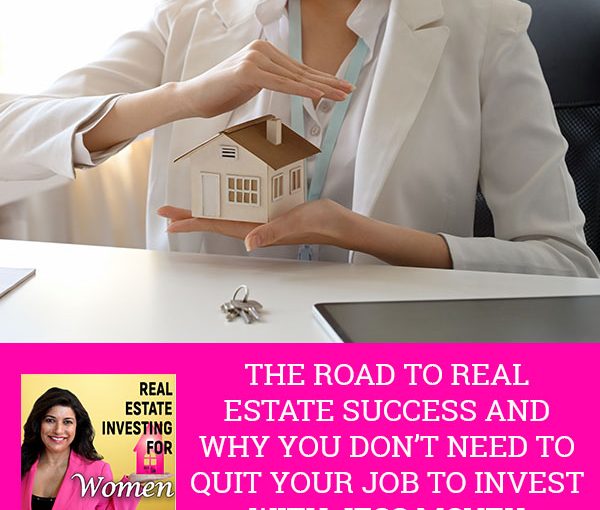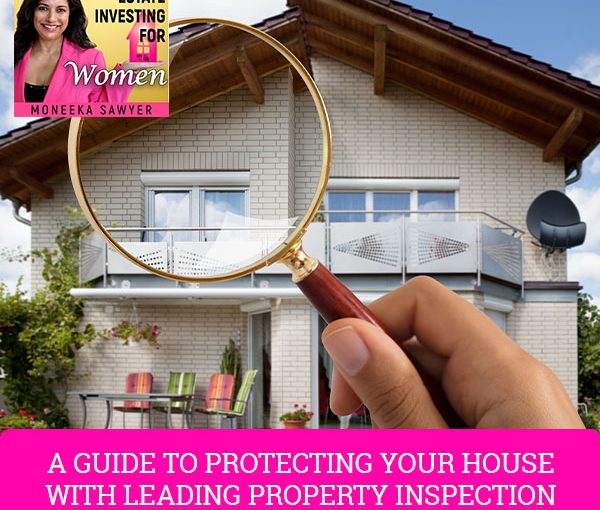Profiting From Commercial Space Conversions With Beth Kromer – Real Estate Women

Commercial space conversion is a value-add strategy that has seen an uptick in opportunities lately. Because of the pandemic, many commercial spaces like retail stores and office spaces have closed down and remained vacant. Coupled with the extreme housing inventory shortage we’re experiencing, this created a unique opportunity for brave investors to make profit from converting commercial spaces into residential rentals. It’s not as challenging as many people might think, and the returns are pretty significant. Beth Kromer, the co-founder of VADU (Value-Added Dwelling Unit), talks about this with Moneeka Sawyer in this episode. VADU is a female-owned and operated company based in Northern California that provides expert advice and oversight for property owners wishing to create residential housing out of existing commercial property. Beth talks about their business and services and how one could convert commercial spaces for profit. Join in to learn more!
—
Watch the episode here
Listen to the podcast here
Profiting From Commercial Space Conversions With Beth Kromer – Real Estate Women
I am excited to welcome to the show, Beth Kromer. She is a neighbor of mine in Miranda. I’m excited to be talking to a California person. Beth is the Cofounder of VADU, which is Value Added Dwelling Units. She has had a successful career in coaching, mentoring, and leadership in large corporations and startups.
Beth has also constructed, owned and rented multiple properties, including ADUs in the Bay Area and Sun Valley, Idaho. Beth has a property financing, purchasing and management background, a Master’s of Public Administration in Housing, and was a Peace Corps volunteer in Ecuador. She lives in Nicasio in Marin with her husband, Robert and her dog, Ralph, and manages their ADU. Welcome to the show.
Thank you so much for having me. I am absolutely delighted to be on the show and to talk about one of my absolute favorite topics.
Beth has this amazing backdrop. It’s her living room window with the beautiful California mountains. I miss it so much because I moved from San Jose to Sacramento. In San Jose, we had the little Santa Cruz mountains behind me that I could stare at and enjoy every day. As much as I love Sacramento, it does not have mountains. I’m loving that view. Ladies, you should go to YouTube and check it out. Beth, could you tell us a little bit about your story? How did you get into what you’re doing?
The company that I cofounded with my business partner, another woman whose name is Margaret Carrigan, we both have backgrounds in real estate. She is appraising and I have a lot of commercial property ownership and also residential with my husband. A couple of years ago, she and I were talking about business opportunities. I am incredibly passionate about the idea of putting it out to two rental units within our houses in the conversion of commercial property.
Here in California, we have a lot of new legislation that highly supports the conversion of property into residential so that we can get more housing into our neighborhoods, which is desperately needed. we started this business. Our website is MyVADU.com. We are in the business of assisting and helping property owners put more residential units within their property.
It’s desperately needed. We look around us and it’s so interesting to see how things are converting after COVID. It seems like everything is changing. There are many places that are boarded up and commercial property owners are feeling the pain of not being able to find renters, losing their renters or their renters not renewing their leases because people don’t need office space as much.
Now, people are more working at home. It is interesting to watch how this conversion is going to happen. I’m excited that you’re spearheading how to help those of us who have commercial properties to relieve the pain or convert to something that’s much more profitable and easier to deal with. Talk to us a little more about creating the housing within the properties that we have.
That most people intuitively, if you visit downtowns or you will work, you know that the demand for commercial space is particularly office space. We can talk about retail, but if we want to talk about our office space, it is significantly down and 27% of all office space in the United States is vacant. This is what while into the pandemic. For all intents and purposes, it’s not going to come back. This demand for office space, where people went into an office on a daily basis, was something that was flipped on its head. Even if businesses think, “I’ll have a hybrid thing where some people come back,” sometimes that demand for office space is not there, which you know, but maybe a lot of people don’t know.

Commercial Space Conversions: There are certain types of offices that are easier to convert than others. Not super-easy, but there are others that are more challenging.
Commercial leases tend to be very long. It could be 5, 10 or 15 years. What we’re seeing is lots of vacant office space. A lot of the owners are holding that can’t sell it and they certainly can’t rent it, but they might still be getting some revenue in. We’re getting to see that we have owners of commercial space who are desperate. They cannot rent this. There is no demand for it. We have a housing crisis, so we do not have enough housing and rental. With the interest rates going up, a lot of people are starting to rent because they feel they cannot purchase house rental prices. Many of our communities have gone up to 10%, 20% or 30%. To some places, it’s up as much as 50%, like Florida and Bay Area.
It was such a logical, natural conclusion to say, “We have office space that’s vacant.” We know what type of offices can be converted. Commercial space like offices has higher regulations than residential ones. Life safety cones can be flipped pretty easily. We can talk a little bit about what it takes to convert an office space into residential, but it’s not as challenging. As many people might think, the return on investment is significant, especially when you’re thinking of zero renting ability lease, there is no income to being able in the Bay Area to easily rent a one-bedroom apartment for $3,000 or $4,000 a month. The difference is astounding.
I live in Sacramento. My husband took a walk and went to Kaiser one day. I picked him up. One of the things that he mentioned, and I hadn’t seen this yet, but now I’m starting to pay attention, is that he had to walk through downtown and there was a particular area. This is a huge redevelopment area in Sacramento where they’ve got this gorgeous building called The Sawyer. We looked at buying there just because we wanted to live in The Sawyer because we’re Sawers, and it was funny.
One condo there was going for $3 million. We are not doing that. It’s funny but not worth that much. It was interesting to me that in this area, they were selling these condos for this much money, but all the office buildings are boarded up right across the street. How is it that you can have this expensive high-level type of building and then right across the street, have everything boarded up?
What was sad, and he mentioned this to me, is that there’s so much boarded up that those people that own the commercial property down the lane will never be able to rent. It’s got to start over where there’s still some activity happening over at the beginning that that owner might be able to rent. Nobody wants to be in the office space that’s open amongst all these boarded-up buildings. I was like, “As an owner, how do you deal with that?” What we’re seeing is that it is residential, they’re able to sell these high-priced places. My thought was, “Can you convert all these boarded-up buildings into commercial?”
In our first commercial conversion, we were taking office space that was from a law firm and converting it into a single residential unit, multifamily. A couple of things that are super interesting about what we do at my company, which is fun too, is that we concurrently work with the municipality and also the owners. The reason is that pre-COVID, lots of towns would say, “We only want commercial ground level.”
For whatever reason, for zoning purposes, they felt like, “We want commercial,” then mixed-use. The top half could be residential. There is zero demand for this ground level. There are restaurants, coffee shops and some boutiques and little retail shops that are great. To your point, if there aren’t office workers and residential who want to put a coffee shop up, it’s all boarded up around them.
We speak to elected officials and we have influenced towns to change their zoning. You might think that this is incredibly difficult. It does take some time, but the downtowns want to have occupancy and residential units. In California, we’re mandated to do this. We’ve been able to influence them. There are certain types of offices that are super easy to convert or others. There are others that are more challenging. If it’s an office building that’s relatively new and built within the last 30 to 40 years, it will have the correct type of seismic, which is a big deal here in California. You don’t have to go into a lot of engineering and restructuring. What we need to do with residential units is we have to have windows and exits.
Oftentimes it’s making sure that the building is huge, but a little bit narrower and that there can be a window in the front and a door in the back. We simply segregate each unit, put in bathrooms and kitchens, some plumbing and visual, heating and air conditioning. That’s the extent of it. It’s not that complicated, especially since a lot of offices are already segregated into space.
What we find is that we will give the path to people to be able to convert, to make this profitable, which is a win-win for communities, renters and the owner of the property. A huge bonus of this is that when people live in these spaces, they don’t have to have a car. They can just walk to amenities. They’re living and working from home. We have found huge demand, but with a little bit of influencing.
Converting an office space to residential is not as challenging as many people think, and the return on investment is significant. Share on XDo you personally go and help talk to the communities, the building departments and the planning departments or do you teach people how to do it?
Our business model is we get it into a community and start influencing the elected officials, the planning, zoning, and building folks. We try to encourage them to think about what, “This is a solution to a multifaceted problem that you have. You have a problem that you don’t have enough housing. We have a problem that we have this vacancy that we have a lack of vibrancy of our downtown.” It’s a little bit of a hard sell because we have to influence people to change their zoning.
It is usually hard.
We are the first that are doing in these towns. Once we feel that we owe the argument, we can influence and we do that on behalf of our clients. Our clients hire us to make sure that it is legal, allowable and doable. We do an assessment before we even start to make sure that this can happen quickly, within a budget and that we have reason to believe that we can influence getting approved before we even pull a permit.
We help our clients or we’d navigate the entire process from that to having architect builders. We are not general contractors or architects. We are agnostic. We work locally. We help the owners from start to finish. We worked as consultants with them to make this process work quickly and efficiently. We also go through all the financials for them, and they help people rent out the property if they need assistance with that.
There are three things I like to cover. First is if you already have a property, you gave me a little bit about that, but a deep dive into what is the path to get it into becoming residential. The other one is, would you consider it a good idea to buy some of these boarded-up commercial places and then convert them? Is that a good investment opportunity? The last one, and I know that you love talking about this, is how to utilize areas in our own home to create revenues. Those are the three things that I like to talk about. Where would you like to start?
It’s interesting because I follow your train of the path, and I’m like a dog with a squirrel. I’m like, “I like all of the topics.” Perhaps to start with the beginning, if we have people that have vacant commercial office space or even rental health space that they are funding, they can operate it. What we offer is that we free of charge. We’ll do an assessment of the property.
If that is zoning, the year it was built and we can fairly quickly give people a heads up of a rough estimate if this is a red, yellow or green built. Green built would be something that we think is super easy to have a return on investment in a few years, which is astounding. We don’t have to talk about cap rates here.
My husband and I used to purchase commercial property. The return on investment can be 20 or 25 years. We’re talking about 4 to 5 years, which is a big deal. The very first thing to do is if you happen to have a twenty-story office space that is humongous in the middle of a city, that is going to be a very difficult conversion. If you can just think about it, there’s no light or air in the middle of the building if you have an office space that is narrower.

Commercial Space Conversions: About 50% of our office space is probably going to remain vacant.
Traditional offices in smaller or medium-sized downtowns, those can easily be converted. We can give an assessment right off the bat. After that, we have two different paths. We can act as consultants and give people the path so they can work for themselves. We’ll do a desktop exercise for people that navigates them through the entire process or we work for the owners as a percentage of the build costs or the rebuild cost.
All of our clients have started con to that one because of all the work that it takes and we know how to do that. The very first thing is an assessment of the property. 75% to 80% of all office space can be converted, but not 100% percent. It could be converted, but we look at the cost of that. The first group of people that we work with are folks who could be small businesses like a legal firm that we work with, a husband and wife. They had ten office spaces in their downtown place vacant for two years. There’s no chance that anybody is coming back. Upstairs was residential, with super high ceilings and narrow, long, beautiful concrete floors.
It’s like a loft experience that we were able to convert into residential housing, which gets rented like that. We have demand for the two people to rent it before it’s even finished. Some of them know it is real estate. If it’s commercial real estate, it’s all about, “What are you renting for? What can you get per square footage?” What’s beautiful about this is then you can think about, “Do I keep it and be a landlord, or do I sell it?”
At this point, you’re selling multifamily residential real estate, which is highly in demand. Try to sell vacant commercial office space in the small town of San Rafael, which has all the commercial real estate rentals. There are over 100 office buildings in one town that are completely vacant. I watch it all the time. There’s no demand. You cannot rent it out. If it is vacant and you can’t rent it out, your selling price is going to be very suppressed. During COVID, what skyrocketed was residential and warehouses. That’s the real estate that boomed. Commercial real estate for offices is in an incredible slump, and I predict it’s going to get even more suppressed.
Don’t you think that people are going to come back into their offices at all?
No. There were surveys are happening. They say, “I’d like to go back every once in a while.” As we spoke about at the beginning of the conversation, my husband and I also own a rental property in Sun Valley, Idaho, which is a gorgeous location, well known for its skiing and outdoor font. During COVID, when we would visit there, I would see people working who were on the ski slopes.
I do think there were creatures that love to be together. There’s a lot to be said about face-to-face interactions, but I think that people also cherish being able to live where they want to live and have the ability to travel. A high price will be coming back. By definition, 50% of our office space is probably going to remain vacant.
We moved to Sacramento. I can work anywhere, but David’s job is in tech. His company went virtual during COVID. They committed after Facebook and Google led this movement of, “Everybody can work anywhere. We’re not going to adjust salaries. You can work anywhere,” then Google and Facebook changed their mind. They’re like, “We’re going to adjust salaries based on where you go to,” because people were going to Idaho and getting California salaries like, “That’s pretty awesome.”
The company has realized that it can cut back on expenses. Google, Facebook, and Apple are doing the same thing. They’re saying, “We’ve got these big campuses. If you want to work here, you have to come back.” We’ve moved. We can’t go back. We are two and a half hours away. He can’t work in the office anymore unless we move back to that area, which we don’t want to do.
What I’m hearing so much is the big corporations are now saying, “We are going to utilize this real estate that we have a commitment to.” We’ll see a level of success. They’re trying to figure it out. What you’re saying is these smaller commercial spaces are less likely to have that same movement back into the office.
There is tremendous demand for residential rental property, and almost none at all for retail and office spaces. We already have the solution. It's already built. It's vacant. It's waiting for us to do something with it. Share on XThere are two things that are in play here. I do come from this world where huge corporations have these campuses and they’re like, “It’s easier to manage people if I can see them.” I don’t quite understand that in tech because everything is measured by what you produce, write and create. Let’s take the very large corporations out of this saying that we are not converting nor thinking about converting Apple headquarters into residential. They’re of their own entity, but there are two things that are happening.
Let’s say that you had a company of twenty people and you would have a choice of making those twenty people highly dissatisfied by saying, “You have to come in every single day for 8 hours a day and 5 days a week. You have to live in Downtown San Francisco,” which you may not want to live in. You might want to live somewhere else. You have a group of employees who don’t want the solution, and to you business owner, if you do want that, you have to pay for all that and office space, or you could not pay for the office space and say, “Team, go work where you want. We’ll measure your productivity, not your presence.” I saved millions of dollars over the course of several years by not having to pay for office space. I think about it in that context.
There are the sunken costs of Apple and Google. They’ve got these huge places and what are they going to do with them? You have other companies who are trying to make a choice point, “Do I sign a ten-year contract for office space in a downtown area that’s going to cost me hundreds of thousands of dollars, if not millions, and to make my employments on dissatisfied,” or let them create their own offices to me, the owner for free?”
That’s the piece of the equation that we haven’t quite seen play itself out because I think a lot of people don’t know that commercial leases are very long. You can’t just say, “I want out.” What I think we’re seeing in year 2, 3 or 4 is people are not taking new leases as they did before, but we are seeing all the 5 to 10-year that end and are not renewed because they’re sitting vacant. It’s not a good business decision to have long-term office leases, in my opinion.
Do you think that the people that own the commercial properties will sign shorter leases?
They may sign shorter leases if they can even find anybody who would take even a short lease. What do we do? We do what worked for us in the past. We have a lot of people who own commercial real estate offices. This has been highly lucrative with very little vacancy with the long lease triple neck, where the attendee pays for everything. It’s been great. The whole world has changed. Our perception of it has not changed completely and people that own hope that this is coming back are glomming onto things that you’re talking about like Apple.
Talk to midsize companies where there’s a huge scarcity of workers, especially technical workers. If you aren’t Google and you have to compete to get technical workers who there’s a scarcity of, you’re going to let them work where they want to work. The lagging indicator is the commercial office space owners who are hoping and are still getting revenue. Many of them, even if it’s vacant, if it’s boarded up, you and I think, “They’re getting no revenue.” They probably still are getting some revenue, but that’s not going to happen for a firm.
Leases haven’t run out, is what you’re saying.
The owners of the companies had the lease go bankrupt or default on it. They have to keep paying it and renegotiate it. Maybe they’re paying a lesser amount. When we are seeing hundreds and office spaces and buildings that are going to be vacant and growing month after month, we all should be watching that 27% or 28% of complete office vacancy that’s going on.
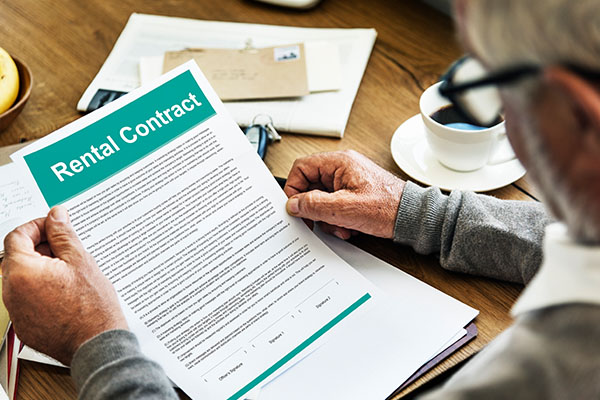
Commercial Space Conversions: Commercial leases are very long, and you can’t just say, “I want out.” It’s not a good business decision to have long-term office leases.
You’re talking about offices, not retail space.
The 27% or 28% is only office space. Now we can talk about retail. If you happen to own retail space during COVID, and even before that, there’s so much that it has been said that COVID accelerated trends that were going to happen. Who completely won during COVID was Amazon. Delivery to a home is a gift now. if you think like, “I need a little thing for my kitchen. Am I going to go to a store or order it on Amazon and get it within hours of the next day?” We’ve all been conditioned to something that we’re going to anyway. Every retail company is feeling this. I was shocked. I didn’t realize that 75% of Starbucks business is either online or pre-ordered or goes through a drive-thru. We are quickly moving to a digital non-interface transaction to get things like food and shopping.
We used to go downtown because we worked there. Everybody eats lunch and has coffee. Now people are working downtown, so you don’t go get coffee and lunch there, but people still would like to live and work downtown, perhaps in their own space. The retail that might work going forward is boutique and charming little places where you can find things you want to touch and try. The restaurants or coffee shops are all great. I question whether people will want to drive downtown and buy something that they could purchase simply online, which does not need you to touch, look and interact.
Our retail suppression is huge and it is not coming back. It’s a whole other conversation, but for the intents and purposes of real estate, we’re thinking, “There’s a huge opportunity here, tremendous demand for residential rental property.” Condominiums, no demand, very little retail demand for a little office space, almost no demand, but if we want to have these coffee shops, bakeries and restaurants thrive in our downtowns, we have got to get people back in. We have the solution. It’s already built. It’s vacant. It’s waiting for us to do something with it.
Can you talk to me a little bit about what a conversion might cost? I know this is a huge wide open question. Let me give you a little bit of context. Ladies, if you have a deeper question or a different question, please contact Beth. She’s going to give you contact information. This is specifically for me because I’m right in the middle of my own things. I’m going to share this with everybody. I have been building a multi-use condominium complex. I have 2 condos and 1 little commercial unit. The zoning was commercial, but they allowed mixed-use. It took us ten years to get that through. We’ve been sitting on this property for a very long time.
Ladies, I think that this is valuable for you to read because I’ve talked about this project a lot. This is an update on what’s going on. Because of COVID, lumber costs went up and we’ve had a huge amount of problems with the supply chain, all of those things that you have been reading about that Moneeka is dealing with. This project that was supposed to have been done in January 2022, even December 2021 was close to done, but it’s that last 10% that takes 90% of the time with construction.
We’re at that point of trying to get it done. I’m super excited about it still. We’re still in those last few moments. Now we’ve got our two condos up above. They’re spectacular and beautiful, then we’ve got this commercial space down below. It is zoned retail. We were originally thinking office space because it’s a destination place. It’s a walkable area, but it’s hidden. It was behind other buildings. It’s not accessible for walking traffic. It’s kind of a destination commercial spot.
We were thinking that maybe we could get a variance and get it as office space instead of retail. As you and I are having this conversation, the first thing that comes to mind is we’ve got this commercial space. Just for perspective, once we sell the two condos, we will have made a very nice profit. We don’t have to sell the commercial space down below and have thought about keeping it and renting it.
Keep in mind that it took nine years to get the variance on our zoning from retail to multi-use. If we talk to the city about possibly converting this commercial space, goodness gracious knows how long that’s going to take. What’s going on in my mind as you and I speak that is, does it make sense to start that conversation? Should we not build out the commercial because maybe we should wait and then convert it into a studio apartment later instead of building it out? Do you see what I’m saying? Do you have any ideas around that context?
I have tons of ideas about that. Is your space in California?
Look at how many vacant office buildings are for sale. If you can go in and get a really good price and purchase something and convert it, you probably are going to be making a profit in just a few years. Share on XIt is in Los Altos.
First of all, congratulations on doing what you’re doing. It took us three months to get an exception, to be able to put a presidential and ground level in San Rafael. We’re greenlit in three months and our clients are like, “That seemed to take a long time.” I’m like, “No.” What many people probably don’t know is there’s an actual state law that says, “Mixed-use and commercial residential property, you have to be allowed to put residential in ADU.” It is a law and that has to be zoned. The local groups cannot block it.
First and foremost, that’s one of the things that we do in my company. My cofounder and I in our group, we absolutely know California Law. It is all in favor of putting residential units. I love that. People are like, “What? You can put mixed-use in commercial space?” Absolutely. Excessively it won’t link you to an ADU Law. You can convert things that have been put in boiler spaces, storage, basement, garage of mixed-use commercial space. It must be allowed to be an ADU.
We talked about that quite a bit. However, we don’t want to stop there. We believe that with the element plan in California and a quick synopsis of it, the state of California mandated that every single county in towns within the state be put in more residential housing. If they don’t do it these next years, we’re at the beginning of an eight-year plan. All penalties come in. Municipalities are desperate to get residential housing because they don’t want to give up their authority on what will happen if they don’t do that. We simply come in, talk to the municipality and say, “We have the solution. It’s right here. What would it be the sense of blocking it?”
We would throw in affordable housing once again in our neighborhoods. A one-bedroom apartment rented at $3,000, believe it or not, is considered affordable housing. It’s affordable, but it’s also profitable for owners. If it weren’t profitable, we’re not going to get housing. I talk about that a lot because I am a property owner. I do rent it out, but I don’t do it simply out of the goodness of my heart. We also make passive income.
If we don’t have it profitable for property owners, then in my estimation, it’s not going to happen. There’s a win-win here. Your property, if it were me, I would seriously consider residential because where you have your building that’s a huge demand for residential. It’s incredible. You would have people lining out the door as it goes to trying to give rent concessions or, “Please come and you have an office here.” Why don’t you ever run into someone who can live and work there? That’s my thoughts on that. I hope I have answered that question for you.
I love women with strong opinions. I am one. That’s awesome. The thing that’s going on in my mind is we had nine years to get the variances, get everything through. We’re on the back end of finishing the building. Should I approach the city now or get all the approvals as it is, sell the two condos, then go back and say, “Let’s do something with this commercial because of the current circumstances?” I’m afraid to get them pulling all of our approvals that then we can’t sell the two condos. We’ve got a huge loan on this.
I appreciate your concern because we have done a lot of building and I understand you don’t want to take anybody off. What I would recommend is that you would work with us and because we aren’t you. We simply come into municipalities with a mindset of, “We’re here to give you municipality a solution.” We do it very neutral, diplomatically and friendly. We even ended up talking to elected officials like mayors because they love this idea. We’re not making it about this particular, your singular issue, but the more holistic problem that the municipality is having. We’re here to help you find solutions. It is great publicity to do something like this for the municipality. They’re excited about that. To be incredibly self-serving, I would love that.
We do things like that. We do work with just very particular issues. The other thing I think about is that we gently, firmly and friendly remind municipalities and counties what the law is because they don’t know. We show it to them early. We are like, “Do you know that you ministerially have to approve this in 60 days?”

Commercial Space Conversions: California law is all in favor of putting residential units in.
When you’re talking about your odyssey a few years, when we’re talking about ADU, the state of California said, “You have to approve plans within 60 days and you cannot block it unless it has to do with life safety code.” What has happened in the past that took many years to do even to get variances? I’m not even quite sure you need a variance to make that presidential. I wouldn’t even question that. That’s already in California. It could already be mandated in the state of California.
We don’t use the word Mandated. We say, “Did you know?” We educate people quite a bit because it’s in our best interest. Getting back to cost, I know I skirted that because, during COVID, one of the things that we do quite a bit is we do so much pre-work and think this through. Here is my opinion. Anybody can build anything that’s super expensive. If you have no budget, you can do anything. The real interesting problem to solve here is how to build an economically, but good so that it’s profitable. We have architects that work not on a percentage as a bid but give us a bid based on their hourly rate. That right there is hugely different.
The second thing is we make decisions based on what is available, practical, and beautiful, but what we’ll be able to put in, in rent at the price point that we’re targeting. When we are building, we pick what’s available. What are the refrigerators we put in? The ones that are available. What is the flooring that we’re going to put in? Durable, beautiful and available.
The contractors that we’re going to use, we’re going to predominantly pick them up when they’re down season, the rainy season. We don’t have a problem with subcontractors or contractors because we’re working side an envelope. In the State of California, you cannot pour a foundation after October 15th because of the rain and the floods that can happen. By definition, our conversions are all interior, so we don’t have any limitations with that.
There are things that you can think about. I’ve built with my husband beautiful houses, but that is not interesting to me. What is super interesting is good housing that can be rented and then owners can make a profit. People that reading, which I’m so happy about women, we are so good at this. We know how to make homes, how to work within constraints and people.
We know how to influence people without being super aggressive. We sneak in and we get this stuff done. I can do a spreadsheet like no one else. People double-check my work because they can’t believe the return on investment is as good as it is, but my spreadsheets are good and it’s profitable. We do not take years. We take months to convert.
Let’s go to the next piece, which is do you think that it’s a good investment to buy some of these commercial properties? There are a lot of commercial property owners that are just desperate. For my belief and tell me if I’m wrong, they’re going to be selling for pennies on the dollar because they can’t rent it out. They don’t understand the idea of conversion unless they’ve read this show. Many of them don’t understand that.
Does it make sense? Commercial property is more expensive than residential in general. Even pennies on the dollar might not be a good deal. Could you speak to that whole thing? Does it make sense as an investor in residential to buy some snap up some of these commercial office spaces and then convert them? What do you think?
That’s exactly what some of our first clients are doing. We converted their already owned property and they loved it so much. They’re like, “I immediately going to buy more.” Commercial property could be more expensive, but necessarily not in Northern California. It depends. When you’re going to sell a commercial property or purchase it, you are looking at what type of rent you’re going to get per square foot.
That’s the whole thing, right? It’s all based on revenue. If you want to leverage it or get a loan, and if it’s already rented, it’s so much more valuable. If it’s vacant, you’re just going to do speculation. I would not buy commercial space right now that is vacant and speculating that you’re going to rent into retail or office space.
You want to buy things before everybody decides they want to buy it. Share on XThat is not a conscious decision. However, if you come and just look at how many vacant office buildings are for sale, there are so many. Who’s going to buy them? We give people estimates before we even start working with them. We can’t guarantee it, but we know what things cost. If you can go in and get a good price, purchase something and convert it, this can be profitable in a few years, which is amazing. What is even more interesting is what if you purchased it, converted it, occupied and then sold it?
My husband and I sold residential property because there was a feeding frenzy Now we’re going to be purchasing more because it is slowing down. I think that if you want to buy property. You want to buy things before everybody decides they want to buy. It’s human nature that you’re like, “I need to buy a house now. I’m going to outfit the next person by 5% or something.” Let’s all decide that’s an emotional decision, and I get it. For commercial right now, you have no competition unless you want to buy warehousing. Warehousing is very high priced, but downtown vacant office space is cheap.
That’s all relative. The other piece that I wanted to talk to you about is turning spaces in our homes where we live and already own our own residential real estate and how to convert some of that into highly profitable spaces. We are out of time, though. What I’m thinking we’re going to do is take that to EXTRA. Does that sound fun?
That sounds wonderful.
Ladies, we’re going to be talking about how to turn your home into a profit center if you want to. We’re going to do that in EXTRA. Before we close down the show, could you tell everybody about how they can reach you because I’m sure lots of people has questions for you?
The best way to reach me is by email at [email protected] or the website, MyVADU.com. The company’s name is VADU. That’s the very easiest way to get ahold of me. I always respond to emails. I love talking about space. We absolutely will do a free consultation. We usually say it’s about a half hour, but it usually runs until 2 to 3 hours. What happens is that people become so interested.
Our conversion rate of clients is super high. We know the space and we’d like to talk about it. If you get a hold of me, if it is a property that you own, that you’d know somebody that owns it, or you’re thinking of purchasing, we do like to know the property because it is going to be dependent on that property because we will tell people if it is not a good idea to convert or if you do, it’s going to be expensive. We do talk about the particular property.
This has been amazing. Thank you.
You’re welcome. It’s been such a pleasure.
I’ve had so much fun. Ladies, stay tuned for EXTRA. We’re going to be talking about turning some of your personal space into profit space. If you are subscribed for EXTRA, stay tuned. If not, please go to RealEstateInvestingForWomenExtra.com and you can sign up now. For those of you that are leaving us now, thank you so much for joining Beth and I for this portion of the show. I look forward to seeing you next time. Until then, remember goals without action are just dreams. Get out there, take action and create the life your heart deeply desires. I’ll see you soon. Bye.
Important Links
——————————————————
To listen to the EXTRA portion of this show go to RealEstateInvestingForWomenExtra.com
Learn how to create a consistent income stream by only working 5 hours a month the Blissful Investor Way.
Grab my FREE guide at http://www.BlissfulInvestor.com
Moneeka Sawyer is often described as one of the most blissful people you will ever meet. She has been investing in Real Estate for over 20 years, so has been through all the different cycles of the market. Still, she has turned $10,000 into over $5,000,000, working only 5-10 hours per MONTH with very little stress.
While building her multi-million dollar business, she has traveled to over 55 countries, dances every single day, supports causes that are important to her, and spends lots of time with her husband of over 20 years.
She is the international best-selling author of the multiple award-winning books “Choose Bliss: The Power and Practice of Joy and Contentment” and “Real Estate Investing for Women: Expert Conversations to Increase Wealth and Happiness the Blissful Way.”
Moneeka has been featured on stages including Carnegie Hall and Nasdaq, radio, podcasts such as Achieve Your Goals with Hal Elrod, and TV stations including ABC, CBS, FOX, and the CW, impacting over 150 million people.
From Stress to Bliss In Business And Life With Moneeka Sawyer
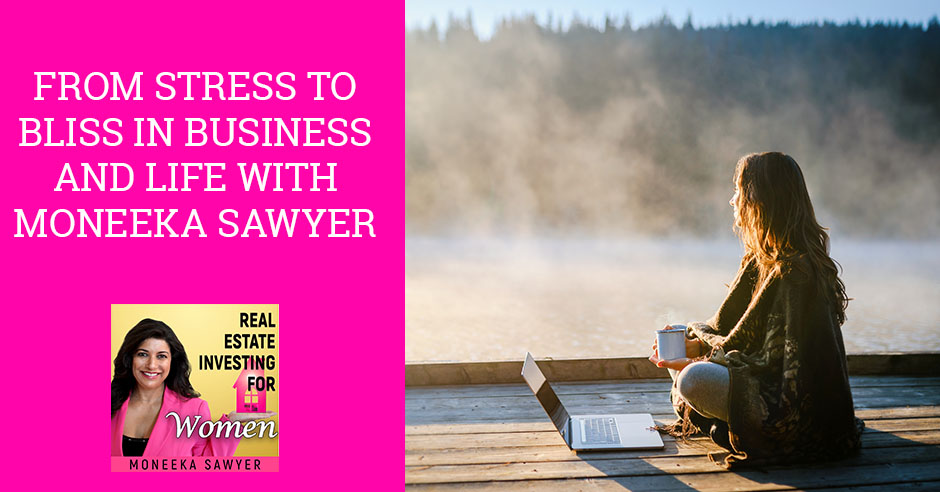
When you’re frustrated, you may notice something unexplainable happening in your body, which doesn’t feel good. How can you turn stress to bliss? Join your host Moneeka Sawyer as she dives deep into building authentic happiness, emotional intelligence, and self-discovery. She discusses how the power of being in a bliss mode affects your business and whole life. Nothing changes until you take action and you determine your life with the choices that you make. So why not choose to be happy? Tune in to learn valuable insights about managing our emotions and embracing the joys life has to offer.
—
Watch the episode here
Listen to the podcast here
From Stress to Bliss In Business And Life With Moneeka Sawyer
Real Estate Investing for Women
In this episode, I have something a little bit different for you that I wanted to share. Originally, my flagship book was called, Choose Bliss. For a long time, I talked a lot about that. I traveled around the country and whatever, and then I moved into Blissful Investor. I started this show and all of that stuff. During this time that I’ve been so focused on Blissful Investor, I haven’t been asked to talk about Choose Bliss very often. I’ve been on television a couple of times. During the pandemic, I was on television, talking about Choose Bliss. When you’re on TV, it’s like a 3, 5, 7 or 10-minute spot. It’s a short period of time. They’re usually asking questions.
I was asked to do a 30-minute talk on Choose Bliss. I have to confess I was a little bit wary because I haven’t been talking about it for a long time. To be honest, I personally have changed quite a bit since I wrote that book. That book was the beginning for me. It felt channeled. There’s so much about it that I learned as I read it because I don’t remember everything. I’m still me, but the book inspires me often. I have evolved and changed. When I got asked to talk about it, I thought, “I just can’t pull up one of my old talks that I used to do. I needed to create something different.” I did that. I did my first talk about Choose Bliss since the pandemic. It was so much fun.
I did something completely different. It’s very interactive. I had so much fun presenting it. It was delightful for me. I thought that you ladies might appreciate it. I’m hoping that you will benefit from it. I would love to hear your feedback on it because it’s the new format that I’m looking at doing for my Choose Bliss talks. If any of you have any advice, I’m always open. If you feel that it’s valuable, I would love to hear that too. I wanted to share that with you. I hope you enjoy this. I also hope you have an amazing week. I’ll see you soon. Thanks.
—
Moneeka Sawyer has often been described as one of the most joyful people you will ever meet. I can attest to that. For over a decade, she has been helping successful professionals, executives and entrepreneurs ease anxiety, overwhelm and stress so that they can experience more joy, ease and success in all areas of their lives. She is the author of the international best-selling book, Choose Bliss: The Power and Practice of Joy and Contentment, which is honored by the prestigious Quill Award for best literary work from the governor of the state of Maryland and several other awards.
Moneeka is known as the blissful millionaire. She is a TEDx speaker. She hosts the highly acclaimed podcast and nationally syndicated radio show, Real Estate Investing for Women. She has been featured on stages with Suzanne Somers, Martha Stewart, Ice-T and Coco, and places like NASDAQ, Harvard, Carnegie Hall, and on TV, NBC, CBS, ABC and Fox reaching over 150 million people.
She was also interviewed by my hero, Hal Elrod of The Miracle Morning community on his podcast. That was huge because I’ve never met anybody who’s been on his show. With that, I want to introduce you all officially to Moneeka. Moneeka, it’s a pleasure to have you here. We look forward to learning from you and smiling by the end of the day.
Thank you so much for inviting me here, Anastasia. I’m honored to be spending this time with everybody. I was here a couple of weeks ago, and Anastasia mentioned what it is that I took from Hal Elrod’s show. It warms my heart when people integrate what I talk about. Sometimes as a speaker, you’re talking out of the ether. Many of you are speakers so you know. You don’t know what happens. Thank you, Anastasia. I’ve been smiling ever since because of that.
It’s nice to meet everybody. What a wonderful conversation. I love that everybody does introductions. I get to know all of you. Before we start, I would like all of us to ground for a minute. Would you guys join me, please? Let’s take a couple of deep breaths in and push that breath down to the ground so we can all be present. Let’s do that together.
Thank you for joining me in that. I like to start every day with a little bit of grounding so I can be aware of my bliss. We’re going to be talking about bliss. I want to start with this. Did you know that your mind in bliss mode, which is different from neutral mode, stress mode or negative mode, gives you a huge advantage in life and business? Many of you understand about mindset. I’m sure that you’re aware of that, but I’m not just talking about the positive mode. I’m talking about bliss mode.
Definition Of Bliss
Let me define what I mean by bliss. Bliss is a deep sense of joy and contentment, and the confidence that you can handle anything that comes your way. Bliss is about emotional mastery and emotional resilience. Why is this important? What does this have to do with our life or business? Warren Buffett says, “If you can’t control your emotions, you can’t control your money.” If bliss has to do with emotional mastery and emotional resilience, you can see how this relates to Warren Buffett’s world of business. I hope you can also see how it relates to everything else we do in life.
If you can control your emotions, and I like to say manage rather than control, if we can manage our emotions, we’re able to make better decisions that will support the joy in every area of our life, whether it’s our health, working out, what we eat, relationships, business or investing. We talked a little bit about real estate. All of those things are going to be affected by how we make decisions. If we make decisions based on the filters of bliss, we’re going to make decisions that are more supportive of the joy of our life. I hope that makes sense to everybody and that feels relevant.
I put together something special for this group. This is not my normal talk. When I visited before, I noticed how interactive all of you are and how much great wisdom is already here about mindset, bliss and joy. I wanted to have an experiential talk rather than just talking at you. I hope that’s okay. I hope you’ll join me and be fully engaged as we move into this experience of bliss. This is going to be funny because we’re going to start with the unblissful piece. I promise I will pull you out of that fast, and you will end the day feeling blissful.
Frustration
What I would like to do is for all of us to think about something that makes us unhappy, something that causes frustration, and might cause a reaction in you in a normal circumstance. Maybe it’s getting cut off at work. Maybe it’s thinking about the school system. Maybe it’s watching the news. For me, one of the examples that I like to give is if I wake up in the morning and my website has been hacked again. I don’t know why this happens so much to me. You can imagine that something like this will send my head into a complete tailspin.
I want you to have this experience in the same way. At that moment, what can happen to me is my head would go into a tailspin and then the story started. My monkey brain goes crazy. I’m like, “Again? I can’t believe this is happening. I hate tech. It never supports me. What am I going to do?” My mind goes on and on. Eventually, I worked myself up into tears, call my webmaster, and then he takes care of it. Still, I’m in this state of frustration, which is hard for me now to focus on the other things in life that I would like to be doing. It takes me time to come back to my bliss state.
That’s the thing that I’m looking for. I would like you guys to think of something like that, that sends you or could possibly send you into that feeling of frustration. Think about it. I want you to feel it. I promise we’ll get you out of there, but I want you to feel into it. As you’re doing that, I also want you to notice what happens to your body. We’re going to talk about this in a second, but I’m going to stop talking for a minute so you can get into that mode.
Bliss is a deep sense of joy, contentment, and the confidence that you can handle anything that comes your way. Share on XAre we all there? It’s interesting from my perspective to watch what happened with all of you. Everybody was smiling. We were all happy. Now everybody is like this. Notice what happens to our bodies. When I get frustrated, you saw what happened. My hands went to my head. My head is down. I’m all scrunched over. My shoulders are forward. My lower back hurts. There’s physiology also that happens when we’re feeling that level of frustration.
More About Bliss
Now let’s switch gears and we’ll talk about bliss. What I want you to think about now is something that makes you feel happy and good. This is going to be a bliss trigger for you. For me, I’m lucky that I have a bliss trigger that happens every single morning. I get my little puppy out of his crate. He’s all wiggly, waggy and adorable, and wants to be cuddled. We get to cuddle in the morning. One of the things that I reminded myself of way better than meditation, although I do meditate, to put me in a specific bliss mood at the moment is cuddling with him, feeling the joy, and breathing into that joy so I can take that joy with me into my day.
What I would like you to do is take a minute. This one, I want you to feel into it because I want to pull you out of that yucky feeling you just had. Think of something that makes you feel good. This is going to be a bliss trigger for you. It’s something that feels yummy, that makes you feel happy and smile. I want you to write down a couple of trigger words for that. For me, it would be, “Morning with my puppy.” That way, you know you can go back to it. I’m going to be quiet for a moment and let you guys think of that and then write down some trigger words.
I’m watching people’s faces change, but I’m noticing a couple of faces haven’t changed yet. Are we all there? Give me a nod if you’re feeling. Susan, thank you so much for that comment. We’ll get back to that later. How are you guys feeling? When you think of something that brings you joy, it happens emotionally. You can’t help it. Our minds affect our bodies and our bodies affect our minds. You’re feeling joy.
I want you to take a look at your bodies and what’s happening there. For me, when I think about my puppy, notice that I’m sitting up straight. My shoulders are back. I’m smiling, eyes forward, and so much more engaged with the group. My head isn’t down like this. There’s a complete physiological change that happens. When you’re in this bliss mode, now you can look at things from a different filter.
What I want you to do is now to think back to that yucky situation we introduced earlier. Think about that and notice what happened to you. Did you slump over? Did you have the same reaction that you had before, or is it different? Do you feel differently about it? Would you react differently to it? For instance, in my computer hacking situation, let’s say I had this lovely moment with my puppy in the morning. I’m feeling all blissful. I go to my computer and I noticed that my computer has been hacked.

Stress To Bliss: Your mind in bliss mode gives you a huge advantage in life and business.
In this situation, I would probably take a couple of deep breaths as I did with you earlier. I feel my frustration. I would then immediately call my webmaster and have him handle it. Now it’s off my plate. It’s out of my day. It only caused a little bit of frustration and I’m back to work without much interruption. Can you see that in bliss mode, I’m much more productive, I’m much more joyful, and I’m making better decisions? Does that make sense? Did anybody else have the same experience? I would love to hear some feedback from you guys, maybe 1 or 2 people. Yeah, thank you, Susan.
I start my day quite early with exercise classes from Sloan Kettering on Zoom. When Zoom throws me out or freezes, it does set my head spinning. It’s my fault, but that does change my mode.
Susan, did you feel a difference when you thought about that first and then we went into bliss mode and then you thought about it later? What was the difference between those two ways of looking at the same situation?
When I thought about what makes me smile every morning, I smiled.
How did you react to the Zoom dropping you off?
Let’s not have it happen with you. I won’t know for a minute. Those things happen intermittently. They happen and it’s how we perceive them.
When you're in the bliss mode, you can look at things from a different filter. Share on XWe can create filters on how we perceive them. If you’re going to put on filters, you might as well put on filters that support your joy, don’t you think?
That’s a good line.
Choose Bliss
Here’s another line that I love. This is not mine. A friend of mine gave it to me. I’m going to read it so I get it exactly right. “Your mind on bliss always finds better solutions to anything that comes up than a mind without it.” You guys have had this experience. I hope that demonstrated my perspective on what bliss is. This is why I called my book, Choose Bliss, because living a blissful life is a choice. What filters you see the world through is your choice. You’ve experienced this right now. You could choose to go into it in your normal reactionary mode, which is how most of us live, or you can choose to prime yourself with bliss and then go into your world in that way.
Bliss Tool And Moments
The next thing is that you can use your physiology for bliss. I’ve given you one tool. It is to create a bliss trigger. That’s the first tool that I’ve given you. I like to make sure that you guys have things to take away as Anastasia did from one of my other conversations. You’ve got a bliss tool. I want to make sure that you hold onto that. You’ve got some trigger words. What I would like you to do is think right now of a couple of other bliss moments that you can utilize.
This is why I want you to do this, we’ve all been in business for a long time. We’ve all lived full lives. We all know that when stress happens, no matter how much training we’ve had, stress takes over frequently. A challenge can take over. In those moments, it’s hard to be like, “I should be thinking blissfully. This is what I’m going to do.” Instead, you’re starting to have that reaction. If you’ve got scripts already prepared and memorized, you can immediately replace the monkey brain that’s happening for you with a new script that will give you joy. That’s why I like people to have prepared in their mind moments that they can now turn to and decide to live to change the filters at that moment.
What I would like you to do is take a minute and think about a couple more. We got one. I want to give you three because one isn’t always going to do it. I would like you to have three. Think about two more moments that would give you great joy. Write down some trigger words. I’m going to be quiet, so you go ahead and do that.

Stress To Bliss: Notice what happens to your body when you’re in bliss mode or dealing with frustration.
Let me know when you guys feel like you’ve got a couple that you can utilize and you’ve written around some trigger words. Go ahead and nod. I’m hoping that all of you have those. I would like you to leave this presentation with some tools in your bliss tool belt. I hope you got that so you can utilize them. Even if you don’t, you got time. This is a practice that you want to do for the rest of your life. This is one other thing that I want to say about living a blissful life, it’s not necessarily easy. It’s a habit that we create.
Anastasia mentioned something about when I walk into a room, people see me as the most joyful person in the world or whatever it is. The reality is I have bad days too. Being blissful does not mean that you do not have the full range of emotions. You can go from depression to ecstasy. We all have emotions. Those emotions are our right. They teach us. We have lessons. They tell us what’s going right and what’s going wrong. They tell us what to aspire for. Our emotions are a good thing.
A blissful person doesn’t live in the range of emotions. They experience them and then they come back to the core state of bliss that they can call home. Living in that place is a habit. It’s a habit of creating the right filters. It’s a habit of training our minds. If you want that and you want to be able to do it consistently, you have to practice. You need some of these tools. You need to practice again and again. It’s not necessarily easy and it takes time. It’s like brushing your teeth. You don’t get to do it once and then have it be over. Your teeth will all fall out.
You want to make sure that you’re doing this every single day to support yourself. It’s an effort, but it’s worth it. If you make those habits or if you create that in your life and you make those filters, now you get to live a blissful life most of the time. You also make better decisions in your life. You also are more productive like we talked about. There are many more advantages to living a blissful life. It gives you that advantage in life.
Now that I’ve given you one tool, let me give you my second favorite tool. That is to pay attention to your physiology. You already have this experience of walking through what a difference it makes when you’re sad, upset, angry or frustrated. What happens to your body? For most of us, our shoulders will fall forward. We contract. It will show up in different ways in our bodies. When you’re in bliss mode, you expand. This doesn’t look natural, but we do expand.
That physiology is an indicator, first of all, of whether we’re feeling blissful or not. It can also be a leading indicator. Maybe we wake up on the wrong side of the bed or maybe something is starting to happen in your day and you’re starting to collapse, just do the things that you would naturally do. It’s different for everybody. You had this experience before, so you’re aware of what your body does. What does your body do when you’re blissful? Now, position your body in that way. For me, I’ll pull my shoulders back. I’ll start to breathe more deeply. When I’m upset, I breathe much more shallowly. Breathe more deeply. I’ll put a smile on my face. I’m not faking the smile. If you put it on your face, maybe it will become real. It is an indicator for me if I’m feeling good or not. It is whether I’m smiling or not.
When your mind is with bliss, you always find better solutions to anything that comes up than a mind without it. Share on XControl
I’m not going to go on this tangent, but there is scientific evidence that when you smile, all these muscles in your face react. There’s a release of endorphins. Smiling is scientifically good. It makes you happy. Even physiologically, the act of smiling tells your body, “I’m happy. I’m feeling good.” With that physiological response, we can create a posture of bliss to then create the mood of bliss. I’m telling you this because I want you to understand that you have absolute control over your bliss. We can do it with our minds by using the bliss triggers. We can do it with our bodies. In both cases, when you get into a moment that’s feeling unblissful, all you have to do is a little tweak and suddenly your mood alters.
It’s a little bit like magic. The more you do it, the more you get to experience that blissful life that will support everything that you want to do, your productivity, good decisions, good relationships, good business, and good investing. It affects everything. Was that valuable? Did you guys feel like those are some yummy tools that you can use in your toolbox? That’s bliss for a lot of people, I have to confess.
Ashley, you guys have so much wisdom in this room. I’m going to want to hear more about your bliss practices when we get into the Q&A. Keep those in mind because I would love for you to share those. Susan shared about laughter in the morning, and then about bacon. We’re going to talk about that. We need to wrap up, unfortunately, because I don’t have a huge amount of time.
There are two more practices that I want to share with you. One is in the form of a gift and one I will give to you because it’s quick. The golden ticket or the master key to bliss is gratitude. It turns out that your bliss is directly related to your gratitude and how much time you spend in gratitude. This topic is important that I wrote a full chapter of it in my book, Choose Bliss. It’s a deep concept. It’s not just, “Thank you,” although that is good. That’s a great place to start, but there are ways to do it that will enhance your bliss.
The interesting thing about gratitude is you can do it wrong. Some people will do gratitude practices where they’re avoiding lack. They say it in a way that makes them scared to lose it, whatever it is that they’re grateful for. You don’t want to be doing a gratitude practice that causes fear. In my chapter, I talk about the right way to do a gratitude practice. Since I don’t have the time to go over it right now, I would like to give that to you as a gift.
It’s CoreBlissLife.com/survey. I have a little appreciation form for you guys to give me feedback on. If you don’t want to fill these forms out, don’t worry about it. You can go down to the bottom and say, “Yes, I want you to gift,” and give me your email address. That’ll be fine. If you do feel like giving me feedback, I would be honored to hear your thoughts. I respect all of you in this room and would love to hear from you. If you would rather not do that, go to the form, get your free gift, put in the email address, and then use the next couple of minutes while people are filling out the form to write down some practices that you personally do to achieve bliss in your life, or maybe write down some things that you’re going to use from this presentation going forward in your life.
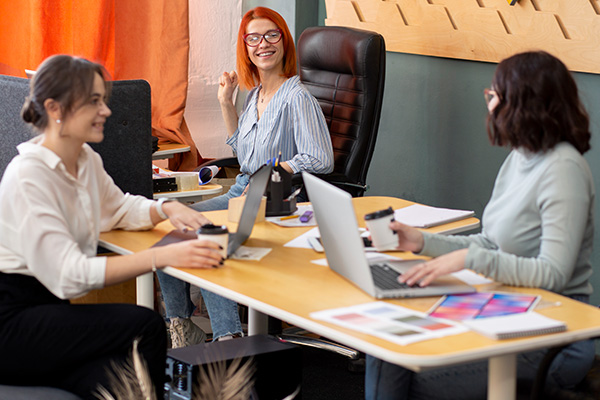
Stress To Bliss: In bliss mode, you tend to be more productive, joyful, and making better decisions.
Extra Credit Strategy
Thank you to those of you who filled out the form. For those of you that want the chapter, I will get that out to you as soon as I can. As I promised, you got an extra credit strategy that I want to give you before we open up the floor for Q&A and your comments. Here’s my extra credit strategy. It is called Stop, Drop and Breathe. This is my favorite one because it’s quick and easy. You can do it anywhere, anytime with anyone. It’s super effective.
This is how this works. Imagine that you’re in that yucky moment. For me, it was my computer getting hacked. I start to notice the monkey mind is going. Understand that a situation does not cause a reaction. The story in your head about the situation causes the reaction. What you want to do is that you catch, “There’s this story starting to happen in my mind. I’m starting to slump. I’m starting to have a reaction.” First, you stop. For me, quite literally from my office, I will say, “Moneeka, stop.” If I’m in a grocery store or in public, I might snap. I have some triggers to stop the monkey mind.
Take your mind and drop it down into your heart. Literally remove it and take it into your heart. That’s the drop. Now take three deep breaths in through your nose. Have that breath go all the way down so it’s tickling the back of your belly button and then breathe out through your mouth. That’s an energizing breath. You want to do three of those or as many as you can do. If you could only do one, you do one.
Notice my voice has dropped. My frustration has gone. Now you’re in a place to be able to respond again from a filter of bliss. Use this all the time. This is my favorite strategy because I use it the most. You can use it in a second. You don’t need to engage your brain. You just engage your body, which is significantly easier.
This one is a little bit of a challenge in the beginning because a lot of people can’t get the breath. We can’t stop the brain or the monkey mind. We can’t get the breath. Don’t give up on it if it doesn’t work the first time. If you practice it 6 or 7 times, you’ll start to notice, “That’s easier.” All these bliss practices take a little bit of practice, but they’re totally worth it. This one is the easiest one to get access to immediately. It has been an honor to chat with you and to spend time with you.
I hope that the experiences and the tools that I gave you were valuable and will help you to live a more blissful life. I know there’s a lot of wisdom in this room. I would like to hear from you. What is it that you do to create bliss in your life? What is it that you loved that you think you will take forward into your life starting right after this meeting to create more bliss in your life? Would anybody like to share? If you have questions for me, please feel free to ask. Anastasia go ahead.
Living a blissful life really is a choice. What filters you see the world through really is your choice. Share on XFirst off, I want to go back to that exercise that you had because I’m fully aware of the whole body posture. I’ve tested it on myself, just something and how I feel right now versus being up and aware. It changes how I feel. This idea of having a positive trigger or a bliss trigger that I can go to not only get me out of the space that I’m in. In my case, I was thinking of wildfires. I was upset over what was happening in Arizona because I have friends there. Bringing back all the stuff that happened to the Bay Area and our families brought me down.
The things I was thinking about were my grandchildren, being with my family, my 60th birthday, the tea and the croquet, all this stuff. I could envision myself, my family, and my granddaughters at that party and how much joy that brought me and bliss. To go back to the wildfires, I did find in my body the differences. When I was thinking about the frustration, sadness, anger and fear, my chest tightens, then we go to happiness and I’m feeling more free. I can breathe better. When you had us come back, my chest didn’t tighten as much. I could feel the sadness again over the wildfires, but it didn’t physically affect me as much as it had after I had been in that state of bliss.
I feel like prophylactically, I should be thinking about these on a regular basis as protection. It’s like a Pepto-Bismol coating on my stomach. If I drink it every day, it’s going to help make it easier for me to not go into that space. That was an interesting experiment for you to have us do. I appreciate that. I want to bring back this thing that you talked about on Hal Elrod’s show that I use all the time. That is similar to your stop, drop and breathe, but to stop and call myself out with, “Anastasia, are these thoughts serving you?” I don’t know about everybody else, but my monkey brain goes down in different directions.
How many of us have had a negative dialogue with somebody? An argument with someone that you are imagining in your head that hasn’t even happened, may not ever happen, but I’ll even go through various iterations of it. It didn’t quite turn out the way I want it so then I’ll change my argument with this person to another argument, and then another argument. The next thing I know, I’m spinning myself and then I have to stop, “This hasn’t even happened.”
I’m all upset, usually in the shower, too. I’m angry at this person. I’m angry at my inability to get them to see things from my viewpoint. What I realized is it is so far from reality. I have to stop myself. I literally would say, “Anastasia, are these thoughts serving you?” It brings me dead in my tracks. I have no choice but to shift. I usually laugh at how ridiculous I am. Sometimes it’s harder to get out of that, but I will say that it serves me. In fact, I’ve got a new monitor now, but I got to do this again. I had a label right at the top of my monitor that said, “Anastasia, are these thoughts serving you?” It is a visual reminder to stop myself.
Viktor Frankl, if there’s one person that I can most understand what he’s talking about when we have a choice, that man has shared with us about choice. It is powerful. I reflect back and I imagine myself in a concentration camp in his situation having a choice as to how I feel. They can take everything away from you, but they cannot take away your choice for how you feel. Your statement that reminds me to stop and are these thoughts serving me brings me back to choice. I want to thank you for that.

Stress To Bliss: When you get into a moment of frustration, all you have to do is a little tweak and suddenly your mood alters. It’s a little bit like magic. And the more you do it, the more you get to experience that blissful life that will support everything that you want to do.
Thank you. Anatasia made a good point in that our bliss triggers can be primers for your day. They can also be the cure for your fall from bliss. You can use them on the front end and at the back end. I recommend that you do because you always want to start your day blissed out. Your brain is in bliss. You can also use it as a cure later. Thank you for saying that. I meant to say that in my presentation. I’m glad that you caught that, Anastasia.
The other thing that I want to say is that people think that life has to be complicated and if it’s not complicated, it’s not good. If a strategy isn’t complicated, it’s not good enough for me. It’s not scientifically proven, Whatever it is, I like simple strategies because it’s the simple strategies that you can implement immediately in a moment that can change everything. I love the one that you mentioned. I love these simple strategies.
One other thing that I wanted to mention is we just got out of a pandemic and we were dealing with the war in Ukraine. There are all sorts of stuff that we hear about in the news. Those things cause stress in our bodies and our minds. How much stress is going to be determined by us? We can’t change the school system by ourselves. We can’t change what’s going on in politics. We can’t change what’s happening outside of us, but we always have control of what’s going on inside of us so just remember that. I love what you said about choice, Anastasia. They can take everything, but they can’t take your choice. Thank you so much for that. Does anybody else want to give us something that they use to create bliss in their life? Susan, and then we’ll go to Craig.
I don’t know if any of you remember the photographer Anne Geddes who did the baby pictures and she put the babies in the flowers. For all of you who have grandchildren, I love seeing baby pictures. Whatever is happening, if I have a friend who sends me a video of his grandson or granddaughter, I stop and watch it. If they don’t send me, I’ll send them notes going, “I haven’t seen a picture. That’s cruel of you.” It’s Anne Gedddes’s idea of pictures of these babies smiling. I don’t care about pets. Don’t send me anything with the pet, but the little infants doing wonderful things.
I would jump on what Anastasia said. I do the same thing. I have these great conversations in my head. I was told there’s a psychological term for it. It’s called catastrophizing. One friend, when she asked me why I didn’t write fiction, I said, “I don’t have that great imagination.” She said, “Are you kidding? That story you told me, you have more imagination than anyone I know.”
We make things up, but also nature. As I am sitting here, I look out across the mountains. I see trees. That’s why I don’t spend a lot of time in my formal office. Bliss is something that is a choice. Certainly, Viktor Frankl and many survivors of many horrible things have said that they make choices. They also make some other kinds of payments. I thank you for this because it’s a good reminder that if I know I need to start my day with humor, not to shortchange myself on seeing things that live. Thank you.
People can take everything, but they can't take your choice. Share on XI love that, Susan. Thank you. Craig, and then Christine.
I was going to say something about choice. Similar to Anastasia, I finished reading Viktor Frankl’s book. It’s all about the choices we make. It’s always good to have a bag of tricks. What am I grateful for? If feel a little anxious or something, I feel what I’m grateful for. It’s important to have a daily trigger. A great example of this is seeing Randal Reeder in his truck with his farm hat and his shirt. That gives me great joy. I’m going to retain this image for the rest of my day. Thank you, Randal. Also, the posture thing. Our wellness and hope expert has so much to say about that. If all else fails, in my kitchen, I have a red box with a glass cover on it and a piece of bacon in there. It says, “If all else fails, go for it.” That’s all I have for you.
That was awesome, Craig. Thank you. Christine, what would you like to share?
Everyone is mentioning Viktor Frankl. He was one of my professors in a couple of classes. I had a unique experience when I was en route to my Master’s and Doctorate in Psychology. It’s an inspiration. I’ve had some amazing professors. He was one of them. I appreciate your learning from what he has written as well, but being there in person with him was truly a learning experience as well. You being here in person is also a very special experience. It also makes me fall to mind things that have made my life special. Music has certainly been one of them. I’ve learned and performed music all over the world in many languages, not always or not typically in my case. At one time, it was for money when I was a student. A lot of times, it’s sharing.
I found that music in people’s lives and hearts can be a trigger to good memories and positive things, not so much as performance, but if shared back with them with the correct pronunciation of their languages and things they learned as children, things that are not children’s or baby songs, but messages and things that mattered to them. That has been one of the things that I’ve been able to get back, and it goes back and forth, to watch the joy and the specialness of things that were music to people, to learn in a positive context if shared back with them in a way that is respectful of the languages and the cultures, not destroying them by not properly saying them or understanding what the message is. That has been one of the things I have found that has been effective to interchange and reciprocate.
Christine, thank you for that. You bring to mind this idea of the givers high and being of service. Even in enjoying music, the way you talked about it was in service to the audience that’s hearing it, not mutilating their language. Service is another one of the chapters of my book. It’s a huge pillar of bliss because when we get out of ourselves and we’re taking into account somebody else, we now have something so much bigger than ourselves to be paying attention to and being of service to others in all different ways, whether it’s speaking their language correctly, whether it’s smiling at them, holding a door for them, or contributing financially or with our time. Those things all give us a server’s high.
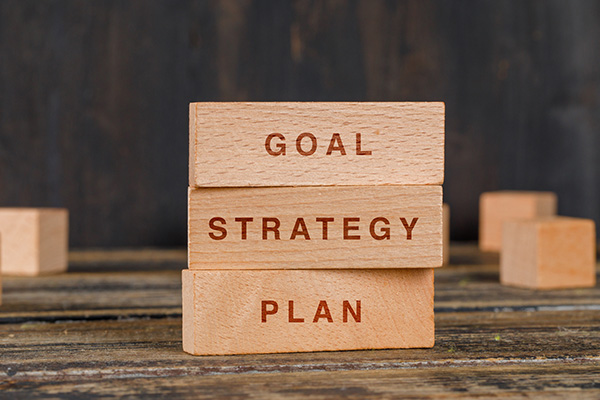
Stress To Bliss: Simple strategies that you can implement immediately in a moment can change everything.
I could talk about that for 2,000 years. I love that. There are so many things that prove that we can go and do things in service. Music has been clinically proven to improve people’s moods. It can be a trigger and an anchor as it is a sound. Adding in that, Christine, this attitude of service was beautiful. I’ve never quite heard it that way. Thank you.
One additional thing that I have found. I was a parent. I can repeat things correctly, but it’s the context also, the message of people’s music, the special things that they started out with. Something special and it’s respectful and it’s something that they appreciate.
Thank you. Does anybody else have anything they would like to add or any questions they got?
I want to go off of Susan’s thing about babies. The one thing that no matter where you’re at or whatever, baby giggles and babies laughing bring a smile to my face. It’s pure joy.
I love that, Tony. At night, I have my Instagram account up on my phone. My husband laughs at me. Everything on Instagram for me is about animals. I love elephants. I love the majesty of lions, and I love ducks. I scroll and I see all these reels about all these animals. It sends me off into this blissful sleep. You’re not supposed to have screen time before you go to sleep. For me, this works to send me into my sleep smiling. I wake up much more naturally on the right side of the bed. I’m much happier when I wake up usually if I do that. I love that. It’s children’s giggles for you. For me, it’s animals. I hope you guys found this talk valuable and that you enjoyed it.
It was excellent. Thank you for joining us, Moneeka and for your talk.
Important Links
——————————————————
To listen to the EXTRA portion of this show go to RealEstateInvestingForWomenExtra.com
Learn how to create a consistent income stream by only working 5 hours a month the Blissful Investor Way.
Grab my FREE guide at http://www.BlissfulInvestor.com
Moneeka Sawyer is often described as one of the most blissful people you will ever meet. She has been investing in Real Estate for over 20 years, so has been through all the different cycles of the market. Still, she has turned $10,000 into over $5,000,000, working only 5-10 hours per MONTH with very little stress.
While building her multi-million dollar business, she has traveled to over 55 countries, dances every single day, supports causes that are important to her, and spends lots of time with her husband of over 20 years.
She is the international best-selling author of the multiple award-winning books “Choose Bliss: The Power and Practice of Joy and Contentment” and “Real Estate Investing for Women: Expert Conversations to Increase Wealth and Happiness the Blissful Way.”
Moneeka has been featured on stages including Carnegie Hall and Nasdaq, radio, podcasts such as Achieve Your Goals with Hal Elrod, and TV stations including ABC, CBS, FOX, and the CW, impacting over 150 million people.
Helping Solve The Affordable Housing Crisis By Investing In Mobile Home Parks With Charlotte Dunford – Real Estate Women
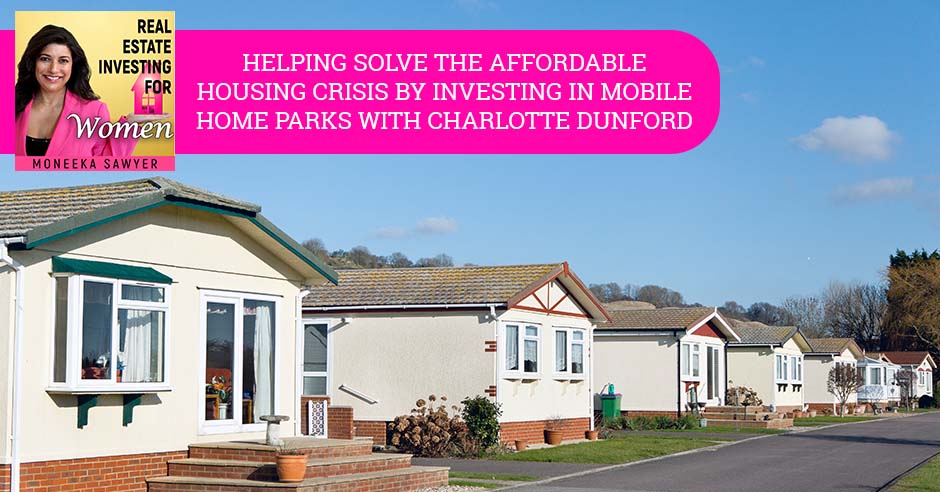
Real estate investors have two options: wait and do nothing or be creative and find opportunities. One of the hottest of these opportunities right now is investing in mobile home parks. In this episode, Charlotte Dunford, the managing partner of John Creek Capital and Investment Managing Company, sees a great opportunity in mobile home parks, which is a long-ignored niche that people were not looking at. She shares why she is attracted to mobile home parks, given their nature; it fights off inflation and is also recession resistant. And because of this nature, the mobile home park industry and the market is not as correlated to the overall market health. Tune in and learn how Charlotte tackles the affordable housing crisis by investing in mobile home parks.
—
Watch the episode here
Listen to the podcast here
Helping Solve The Affordable Housing Crisis By Investing In Mobile Home Parks With Charlotte Dunford – Real Estate Women
Real Estate Investing For Women
I am so excited to welcome to the show, Charlotte Dunford. Charlotte is the managing partner of Johns Creek Capital, an investment managing company that focuses on mobile home park investments with a total investor subscription amount of over $4.2 million. Numbers-wise, they have twenty park investments, and Charlotte, herself, has also created over $500,000 of assets value in the past. She comes from humble beginnings and is a first-generation American citizen and college graduate after leaving China with just her belongings at age sixteen. Welcome to the show, Charlotte. How are you?
I am doing well. Thanks so much for having me.
I am so excited about this conversation. We have not had anybody come on the show and talk about mobile home parks. I am super excited about that. Before we dive into that, could you tell us your immigration story and all of that stuff?
I came from China. I pretty much jumped on the plane and left for the United States when I was sixteen years old to go to a high school here in America. It was Pennsylvania. I did not speak any English. I did not have money, not even a cell phone, or anything. I remember being picked up from the Philadelphia airport and being dropped off. He drove through the woods like a forest wooded area and to my host family’s house. It is a host family I never met before. To me, it was all new. I had to try to integrate and learn the language, learn the culture, and try to climb up the American society through different steps. First, I studied hard to get into a top college here in the south, an engineering college at the Georgia Institute of Technology.
Shortly after graduation, I was able to land a job here in Alpharetta as a business analyst and also doing real estate on the side. I found that using my salary to qualify for larger deals became more difficult as my salary was not going up at the rate of me wanting to acquire. Therefore, I quit my job. It was risky for me and it was a calculated risk because, at the time, I have only been working for one and a half years. My husband did not have a job because he was still at school. He just graduated, so he did not have a job. I quit my job. My little bit of savings and other investments we had were not enough to launch a company, let alone make it succeed.
However, I was thorough in my education and also learned a ton before I quit my job to educate myself on how real estate works and had to start learning from scratch. Fortunately, I was able to do deals when I was still holding my job. I had some experience. After I quit my job, I was quick to start the Johns Creek Capital and grow the company with my partner from 2 parks in 2019 to 27 parks.
Why did you leave China?
There are a lot of Chinese immigrants everywhere and they leave for different or similar reasons. I wanted to pursue better opportunities because in a communist regime, such as China that I grew up under, owning real estate or having any business, you have to have relationships with the government or your family needs to be very wealthy to be able to make the cut. For me, nobody in China owns their own real estate. They lease it from the government for 70 years. The lack of capitalism or entrepreneurial opportunities and a better environment for people like me to grow in was what prompted me to travel to the United States to pursue a new life.
You made that decision at the age of 15 or 16. That is incredible. I want to dive into this a little bit deeper because I want to understand the mindset. I am a first-generation American. My parents are first-generation. It depends on how you define it, but my parents came here as immigrants. There is an immigrant mentality that happens that us Americans, even me as a first generation, having seen my parents, I do not have that drive. They come here for better opportunities because they see something that is not working in their home country. They do not come here, against popular belief, to mooch off the government to try to take our jobs or to do any of this stuff.
They come here because there is something that is not working at home and they want out so bad. They are willing to leave their families, everything they know, and their culture, even if they do not speak the language, to come to create something better for their life to have more choices. We all know that I am all about choice. In most parts of the world, you do not have the level of choice that you have here in the United States. Most immigrants come here and they work their butts off to create something better because it was so hard to get here. At the age of 15 or 16, how do you make that decision?
I never saw the opportunities in China for me, like a lot of people or kids who come to the United States, they come with their parents or a relative. I came by myself. My parents never came with me. They did not even attend my high school graduation. It is that they are very far away. They do not speak English. They are not familiar with anything here. I came by myself. I made the decision because from a young age, I was inspired to achieve more and I did not see the opportunities for me in China. Even in the school system, I knew that I did not belong there.
This independent move on your own, talk to me about how that shifted your mindset. How did it change your outlook on success?
I had nobody. I had to start from scratch. I had to learn English. I had to get along with the host family and get along with the locals and make myself useful. From a young age, for a girl who had to adjust to that, a young girl who was just trying to make it. I was constantly in survival mode. When you are in survival mode, being embarrassed is the least of your worries. That gives me the assertiveness that is required to do what I do. Also, in that survival mode, I knew that was a decision that I cannot go back on. I have to succeed.
Having this belief of having to succeed no matter what, really propels you towards your goals. I think that changed me forever. I was already a very motivated and driven person, but that made me even more ambitious and driven because the more efforts or sacrifice I put into something, the more outcome I would like to see. There is no stopping me now or ever since I got here.

Mobile Home Parks: Not many people are hunting the ocean in mobile home parks.
I love what you just said about being in survival mode. Being embarrassed is the least of your problems or your concerns. It is so interesting how many of us will make choices because we do not want to look stupid. We do not want to do the wrong thing because we have got choices. We have got all of our security, our homes, our parents, and our money. We have got the luxury of being embarrassed. When you are just surviving and you are in a completely different place with very little support, you had your host family. That is fantastic.
My parents did not even have that. You have yourself. You do not have the luxury of being embarrassed, of not being bold, of not pushing yourself to the absolute limits just to survive. It is a beautiful story. Talk to me about how you got into real estate. It sounded like you knew about real estate even in China. Could you tell me a little bit about your real estate story?
Chinese always love real estate, especially when I was growing up. Buying a house and holding that house is always a good investment in Chinese society. However, under the regime, you are not allowed to own your own real estate. You only lease it from the government for 70 years and you have to renew the lease. You never own anything. You have a lot less rights. Owning real estate is extremely hard in China. It is much harder than it would be in the United States. I came here thinking that this is an opportunity that I would never dream of having where I was born into.
I made a promise to myself that I have to start buying real estate as soon as I had the opportunity to, which is right after I landed a job after college to use my salary to qualify for my first single-family home deal. After that, I was able to qualify for another deal. It was a duplex. That is what kicked it off. I quit my job and started mobile home parks because it was a great niche. It was a long ignored niche that people were not looking at. For me, that was a great opportunity.
How are you turned on to the mobile home niche?
I wanted to scale the business. I quit my job and I wanted to go into multifamily originally because the logical thing to do at first is single-family, duplex, 3, 4, 5, and then going to multifamily. The thing is in the multifamily industry, the big boys have been in this game for decades. As a newbie, once you get into real estate and multifamily, that was almost impossible. The brokers will not even talk to you unless you have a pretty big portfolio. That was the red ocean there. I am a big believer in blue ocean strategies, which is a somewhere where not a lot of people are hunting the same ocean. The mobile home park was one of those. I was able to hunt in this blue ocean and get in at a very early part of the cycle to make profits.
When did you get in?
I got in, in late-2019. I quit my job in 2019. I bought my first mobile home park along with my partners. My first private equity deal was n August of 2019 and then the second park in November of 2019. The third park was in December of 2019. 2020 was a big year for us. We acquired many more parks in 2021 as well. We have been closing deals and selling deals and doing the real estate game.
You consider buying mobile home parks more like buying land. Is that true?
Yes. Mobile home parks are a parking lot business. It is a land business. It is not as much of a rental business as multifamily would be.
Talk to me a little bit about the benefits of being in a land of business like that. It is just buying empty land. That is a different land of business. This is a very specific case. Talk to me a little bit about how you view buying this land.
A mobile home park is not an empty land. It is more of a parking lot. It already has utilities set up with homes on it. People are paying a lot fee, parks on your lot. That is where the most valuable things come from. It is the occupied lot with a tenant-owned home on it, paying lot rents versus renting out the mobile home or renting out a home. You have to be in charge of all the utilities, repairs, and maintenance within the home versus a mobile home park business where you do not have the home. You do not want to own the home. You are just in charge of the land, the utilities that are in the park, common area maintenance, general, and then real estate taxes, insurance, and the general parking stuff, not the rental stuff.
The reason why it is attractive, not only because it has a lower expense ratio, it is because the lot rents are incredibly low to start with. It has got a lot more meat on the bone than most other asset classes. A lot of the mobile home park owners are mom-and-pop owners and they do not tend to increase the rent a lot. There is a huge gap usually between the lot rent and the apartment rent, which is another housing product in town, and the market rent. You have a lot more room to make them money. The meat on the bone is the difference between the lot rent into the market with the market handle. There is a lot of room to value add the mobile home park. That is why it is a profitable business.
The mobile home park is an affordable housing business. You are providing affordable housing options for your tenants and giving them that privacy, giving them that home ownership, and boosting the pride of home ownership in the community is what you want. I think it is because it is an affordable housing business and the demand for affordable housing, especially in a recession that we seem to find ourselves in this economy. We become more of a recession-resistant asset. That is why it is attractive. It fights off inflation and recession.
Mobile home parks were a great niche; it was a long-ignored niche that people were not looking at. Share on XIt is not recession-proof, but it is recession-resistant, given the nature of mobile home parks because lot rents are incredibly low to start with. People tend to move to less expensive housing options. Also, our tenant base is not as affected by the recession as many other people would be. For example, a lot of them live on social security income. That is a very stable income source. That is why the mobile home park industry and this market are not as correlated to the overall market health as some other asset classes may be.
You said that there were a lot of opportunities for value add. Talk to me a little bit more about that. When I think about value adds, I buy a place as crappy and I make it beautiful. With a lot that there is already a mobile home on top of or renting, how do you do a value add? What is the process of raising those lot rents? Talk to me a little bit more about how that whole thing works.
The value add of a mobile home park is a neighborhood that you are owning. It is the land that you are owning. Think of yourself as an HOA. You are beautifying the park. You are beautifying the environment around the homes. You are fixing roads. You are fixing potholes. You own the road. You are upgrading utilities. You are adding fences to the neighborhood, making it more pretty, and giving it cosmetic upgrades. You can add a new sign to the community.
You can do all kinds of things to make it cosmetically more attractive. Also, you are responsible for more effective management. You want to build this pride of ownership into your tenants so that they take care of the properties and the park. You are also in charge of common area landscaping, trees, and manicure. All those things are up a value add. Those value add benefits you give to your tenants.
That is when you raise the lot rent. You usually do not want to raise it for more than $50 per year because you do not want to give them too much of a raise that they cannot afford it. $50 per year should not be a problem. As far as raising lot rents, you have to stick to the state regulations. Every state has its own regulations as far as how much notice you need to give your tenants before you can raise the rent.
Some states are 30, 60, and 90 days, but most of them are within 30 to 60 days. You want to give them the notice and you want to work with your tenants and you want to be advocates for your tenants. They are a lot more value out in there. Sometimes the park has a vacant lot and it has already got utilities set up. That is a very expensive process. You can get someone else to move their home into your lot. You can give them some incentives in several months of free rent. That is well worth it to have someone bring a home into your park. Also, you can build back utilities. People tend to use less water when they have to pay for utilities. You can submeter. Those are some of the major ways to value add in a mobile home park.
You mentioned a vacancy. Talk to me a little bit about vacancies and rents. If you went into multifamily, you would be like, “We expect 8% vacancies per year, which means that this many units, we are planning on having this many empty.” Talk to me a little bit about how vacancies work in a mobile home park.
For mobile home parks, the turnover and vacancy are two separate things. The turnover tends to be slightly lower in all tenant-owned parks because they own the home. It is like leaving your home behind. If you own the home, you have to pride ownership of this home. You are a lot less likely to walk away. It does happen, but it is a lot less likely than packing away your stuff and leaving the apartment building. You do not own the apartment building or the condo, but in this case, you own your home. You maybe have a mortgage on the home. The turnover is lower.
Vacancy-wise depends on what you buy it as. If you buy at 80% occupied, it tends to stay that way for an extended period of time. The turnover is more regular in a park-owned home than in a tenant-owned home because the tenants own the home. They would want to take their home with them, but since mobile homes are extremely expensive and hard to move, it is almost impossible to move the home.
How would you feel if you moved in with a 20% vacancy? How do you fill those vacant spots?
You can choose to fill it, which is inexpensive, but very much value add approach. There are several ways to go about it. Number one is to advertise the lot for people to move their own home into the lot so they can bear the costs of moving and home purchase. You have to take care of hooking up the utilities and making sure that utilities are working. That is number one. It is probably the best way, but you do not get those opportunities a lot because it is expensive to move home.
Number two is when you buy a brand new home or a used home and move it to your lot yourself, and then sell this home on a rent credit program, similar to a rental home arrangement. You give it to the tenant based on installments or you sell it to them straight up. Those are the two primary ways to fill lots. The second option is a lot more expensive than the first one, but that is more achievable. You will have to do everything yourself.
Where do you buy them?
You can buy them from mobile home dealers. You can buy them from other mobile home park owners. You can buy from other people who want to sell their mobile homes. The primary source will be a mobile home dealer.

Mobile Home Parks: Many mobile home park owners don’t tend to increase rent much. So there is a vast gap between the lot rent and the apartment rent, another housing product in town, and the market rent.
Where are most of the parks that you own?
Our parks are across ten different states. They are primarily focused in the Midwest and the Southeast. We have a couple up in the Northeast and a couple out West, but most of them are in the Midwest and Southeast.
Why did you choose those markets?
They provide the biggest spread between the cap rate and the interest rate. We want to spread our parks for diversification purposes to diversify our portfolio from a geographic standpoint. Those markets are chosen based on the legislature as well. A lot of times, we do not own a lot of parts in the Northeast, in states like New York or New Jersey, or out West states like California or Oregon or some of the very coastal states. We are in Washington because they are tenant friendly to the point where it makes it extremely difficult to operate in a mobile home park, given the special challenges in this industry. That is why we focus on mostly landlord-friendly places, such as many states in the Midwest and the Southeast.
Could you tell me a little bit more about finding locations and what that process looks like? How do you find the different parks? I understand you want some diversification, which is why you start to go looking. There are some legal things. There are some things about the state laws that impose obligations on some people or not. How do you find the parks, the locations, or the communities? Could you give us some insights on that?
Throughout the time that we have been in the industry, we have built relationships with brokers, sellers, and other professionals in the mobile home park industry that we have enough deal flow going to our desk directly. Once we get those deals, we have a proprietary algorithm utilizing fifteen different parameters to analyze the park and give it a score. The score is going to help us determine how successful this park is going to be. The parameters and the scores are solely based on our own experience and our own data analysis. It is like machine learning, feeding the machine the data that it needs to know the machine starts to learn what is better and was not. It is an algorithm developed by ourselves. It is a simple algorithm, but all the parameters are based on our experience to make a decision.
There are millions of brokers around the country. You are not going to be able to build relationships with all of them. How did you choose which communities to build those relationships in so that those deals would start to come to you?
The brokers we have relationships with usually start with a deal. Mobile home park brokers are not that many. There are a lot of real estate single-family brokers and even multifamily brokers, but brokers who focus or have expertise in mobile home parks are not that many. We usually start the relationship with the deal and see how the broker performs throughout the deal. If we make the deal successful, then usually we would like to continue working with them. The deal is the conversation starter and the relationship starter.
How can people get started investing in mobile home parks?
If you want to start investing passively, you are welcome to visit our website at JohnsCreekCapital.com and talk to me. That way we can get connected. You can invest as an LP, Limited Partner, passively. If you want to start your own mobile home park investing journey, invest actively and turn this into a career, find your niche, and get yourself educated through resources within the mobile home park community. It is a tough asset to manage. You want to understand as much as you can about the asset.
Could you talk a little bit about the challenges of managing a mobile home park? I have friends that have done it and they are like, “It is hard.”
The demographic the mobile home parks have. It is difficult to find good tenants. They are out there. A lot of our parks have wonderful tenants, but there are parks where a lot of tenants are not the most responsible people ever and they would turn your real estate into a mess. That not only does exist in mobile home parks, but I am sure that tenant problems are everywhere. That is in any real estate asset class, multifamily, single-family, or commercial. You have bad tenants and you have good tenants. You want to make sure that you understand the local landlord-tenant laws. Think of the tenants at your mobile home park as a stakeholder because they own their homes there. You want to make sure that there are no bad actors in your company as a stakeholder.
If you have a lot of bad stakeholders, then your company is in danger. That is one challenge. Also, other challenges have to do with the government’s regulations. A lot of times, their job is to find problems in your parks and their job is to find violations that cost thousands of dollars to manage and fix. That is another issue. The biggest money loser in the mobile home park industry is utilities. If you have a utility leak, water leak, or sewer leak, then you not only are subject to the thousand dollars plumbing bills. You are also subject to health department regulations and they could particularly shut your park down. That is a nerve-wracking experience.
The third challenge, last but not the least, is throughout COVID because of the eviction moratorium. Tenants take that as a weapon against the landlords, especially mobile home parks because they take it as they do not have to pay rent. If they own a home that is worth $10,000 and eviction moratorium in some states lasted more than two years. If you have that long of eviction moratorium, they cannot be evicted for non-payment. They can owe you up to $10,000 to $20,000. If they owe you more than what their trailer is worth, they are going to walk away. They are going to walk away, leaving you a problem property, an empty trailer, and trash with things. You are left with an empty trailer that you do not have a title to. You cannot rent out again.
A mobile home park is a parking lot. It is a land business. It's not as much of a rental business as a multifamily would be. Share on XYou have to go through the entire legal process to regain the title, which is another headache and because of the abandoned home, the city is going to cite you for violations of an inhumane environment. You are stuck in the pickle. We have parks where cities go after us for homes that we do not own. During the eviction moratorium, we have no right to evict them, but the city wanted to shut us down for not removing them. We will be breaking the law if we were to remove them. Those are the situations you have to face. You have to be very diplomatic and creative in your solutions to dealing with these people.
Do you have a whole team of people that do those things?
My partner is generally more in charge of the operational side of things. We do have boots on the ground and usually a watch person at each park. For each park, because they are far away from each other, we have a local team. He has good business and real estate experience and management experience. We usually assemble a local team that consists of contractors, government officials, and local park tenants to take care of all the repairs and maintenance issues.
Did you find that during the eviction moratorium, you did have a lot of people not paying rent? What were those numbers like? What percentage stopped paying?
5% to 10%.
That is not as bad as I thought.
It is not as bad as multifamily or commercial. During the COVID pandemic, the hospitality industry went down 70% to 80%. Multifamily went down 15% to 20% and mobile home park revenue went down only by 5%. It is not as impacted, but still, it can be a problem. It becomes more difficult. This is a nationwide problem, not just mobile home parks. All real estate professionals face this issue. It is the lack of labor. Contractors are impossible to find.
Could you talk to me a little bit about what it is like to work with you and your team? If people want to invest in mobile home parks, they want to diversify their asset base, but they do not want to do it themselves. Tell us a little bit about what it is like to work with you and what kinds of returns people can expect.
Working with us, the first step is to go to our website at JohnsCreekCapital.com and have a short conversation with us. We always have an initial phone call with our investors and get to understand their goals, their needs, and their questions. After the initial phone call, we usually follow up with a deal that we have. We will start the relationship from there. Usually, if the investor is interested in a particular deal, the time between they make the commitment, either verbal or heart commitment, to the time of closing is usually 30 to 45 days. You will have access to our online portal where you can have your own investment account, where you have all of your investments listed there.
As far as returns, we offer an 8% preferred return followed by a waterfall structure of 70/30 of 8% preferred return. It jumps by four points each time. It goes up to 12% then the split becomes 60/40. 60 being the investor, 40 being us, and then it jumps by another 4 points at 16%. That is the highest return waterfall in a given year. That becomes 50/50 and stops there.
The preferred rate of return, which is 8%, is accumulative cash on cash rate return, which means that if in a particular given year, the 8% preferred return is not achieved. That means that deficiency whatever the difference is will be carried over to the next year so that the investors will be made whole. However, the 12% and 60% are extra. They are not the preferred rate of return. We will talk more about that on our phone call and all the offering packages we sent you.
What is the minimum investment with you guys?
It is $50,000.
Could you explain the waterfall? People say this on the show so often. I know what it means, but I am sure people are like, “When will someone tell me what that means?”

Mobile Home Parks: Given the nature of mobile home parks, it fights off all-time inflation high. Still, it’s recession-resistant because many runs are low to start with, and people tend to move to less expensive potting options.
A waterfall is a way to align the interests of the sponsors, which are us and the investors together. It motivates the sponsors to work harder at the deal so that we can achieve a higher return for an investor to trigger a split of profits. The higher return we have, the more split we are going to get. That aligns our interests together. You do not want to work with operators or sponsors who do not have the same interests as you do. You want them to work harder for their dollars. That is the structure that we set up. Think of all the cash as a waterfall. Once you hit a hurdle, every return is a hurdle. Once you hit a 12% hurdle, the waterfall starts splitting. That is why it is a waterfall.
The 8% preferred rate of return means that we are not going to get paid unless you get your 8% and anything after that will be split. Once we get our 8% and then it splits and then 12% it splits again. The higher, the return the more split the sponsors are getting. That is, in a nutshell, what waterfall. It is a return structure to align interests together and make us work harder. Overall, all of our offerings offer an approximately 15% internal rate of return over 2 to 3 years, sometimes up to 5 years of holding time. The annualized return is anywhere from 19% to 20% and above, depending on the holding time.
With a waterfall, you have a preferred rate of return, which is what you are guaranteed each year. If there is additional profit above and beyond that, then they get paid different amounts based on what that is. You said that the annual rate of return is between 19% and 20%. Is that because you sell the mobile home park? Talk to me a little bit about that.
Cash on cash annually without a sale. Mobile home park investment has a cycle. It starts low at the beginning because there are things that we need you to fix and their value add opportunities we need to conduct, which costs money. The expenses go up, which means your returns are staying low in the first year. You are usually looking at 4%. Sometimes we do better than that, but conservatively speaking, that is 4%.
In the second year, you are looking at slightly going up to 6% and then it goes up as time goes on after we finish our value add cycle. For example, the one that we sold, we bought this mobile home park in Iowa. We bought this mobile home park in June of 2020 for $325,000. We had an average of over 8% cash on cash per year, even without the sale for this deal. After a 22-month hold, we sold this deal in May of 2022 for $495,000. This deal delivered a total of over 18% internal rate of return and over 19% annualized cash on cash return.
Tell people how they can reach you. This is all very interesting. I have to confess. I am not sure that I would want to play this game on my own. You would need a team that knows what they are doing, but if you are looking to diversify, this is a great opportunity. Tell everybody how they can reach you.
The best way to find me is to go to our website at www.JohnsCreekCapital.com and hit the contact form. I will reach back out usually within the same business day. I would be excited to talk to you about this recession-resistant asset.
Tell us a few more insights and advice on investing in this mobile home market.
The biggest insight or advice I would give is to understand your niche, your parameters, and what you are looking for. We have a saying in the industry, real estate in general, “You make the money when you buy.” You cannot buy when you do not know what you are doing. You cannot just buy randomly just because something is cheap. You have to have a strong reason and strong logic behind the reasons you are buying a particular asset. Know your parameters, know your requirements, and stick with them. That is the number one thing I would advise.
Do you teach any of this stuff or do you know anybody that teaches about mobile home parks and what to look for?
I personally do not teach yet, but I would not mind that being an option in the future. The biggest mobile home park education, I did not personally go to his boot camps or educational programs, but I heard so many good things about it. Go to Frank Rolfe’s Mobile Home University. He has bootcamps that tells you every single thing that you need to know about mobile home parks.
How did you learn?
I learned from actual experience. That is the best way to learn. You can learn everything on a piece of paper and learning everything. You will not get to understand what it is like until you are in the game. You have to buy. You have to get yourself into the actual investing.
Are you ready for three rapid-fire questions?
The mobile home park is an affordable housing business. You're providing affordable housing options for your tenants and giving them that privacy, giving them that homeownership. Share on XYes.
Tell us one super tip on getting started investing in real estate.
Take action. Don’t do analysis paralysis. Don’t overthink things too much and then you never take action. Take the best action that you can find and move forward.
What is one strategy for being successful as a real estate investor?
One strategy is to have enough reserves. The one thing you can always expect from any real estate investment are surprises. You are going to have surprise expenses. To counter that, you need enough reserves in your account to account for that. If you do not have enough reserves, you are out of business.
Do you have a formula for that?
We usually use $10,000 plus 6 months of income, at least, in the account.
What is one daily practice that you do that contributes to your personal success?
Reading business books or reading all kinds of good books that educate yourself and inspire yourself to achieve more.
Do you have anything you want to close with before we go?
We live in a great nation with many opportunities that you cannot find elsewhere in the world. I encourage everyone to take advantage of the opportunities that you have in front of you and take action. Do not be afraid of fail. You want to fail early and fail often, but get up often as well. Take action and move forward.
I think that we get afraid of failure because we feel like it reflects badly on us. The problem is that unless you fail, you will never get to the next level. I think about children. How many times did they fail to walk before they took their first step? What if they had never kept trying?
It reflects back on us. That is back to the embarrassment topic. If you are in survival mode, that is the least of your worries. If you push yourself hard, the reflection means nothing. Do not worry about how other people look at you. You have to know what you want and go for it.
This has been an amazing conversation. Thank you for joining us, Charlotte.
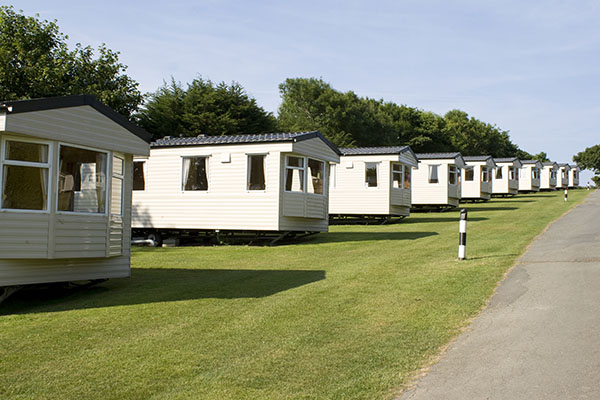
Mobile Home Parks: The mobile home park industry and this market are not as correlated to the overall market health as other asset classes.
Thank you so much for having me.
Ladies, thank you for joining Charlotte and I for the show. I appreciate you. I look forward to seeing you next time. Until then, remember, goals without action are just dreams. Get out there, take action, and create the life your heart deeply desires. I will see you soon.
Important Links
——————————————————
To listen to the EXTRA portion of this show go to RealEstateInvestingForWomenExtra.com
Learn how to create a consistent income stream by only working 5 hours a month the Blissful Investor Way.
Grab my FREE guide at http://www.BlissfulInvestor.com
Moneeka Sawyer is often described as one of the most blissful people you will ever meet. She has been investing in Real Estate for over 20 years, so has been through all the different cycles of the market. Still, she has turned $10,000 into over $5,000,000, working only 5-10 hours per MONTH with very little stress.
While building her multi-million dollar business, she has traveled to over 55 countries, dances every single day, supports causes that are important to her, and spends lots of time with her husband of over 20 years.
She is the international best-selling author of the multiple award-winning books “Choose Bliss: The Power and Practice of Joy and Contentment” and “Real Estate Investing for Women: Expert Conversations to Increase Wealth and Happiness the Blissful Way.”
Moneeka has been featured on stages including Carnegie Hall and Nasdaq, radio, podcasts such as Achieve Your Goals with Hal Elrod, and TV stations including ABC, CBS, FOX, and the CW, impacting over 150 million people.
The Road To Real Estate Success And Why You Don’t Need To Quit Your Job To Invest With Jess McVey – Real Estate Women
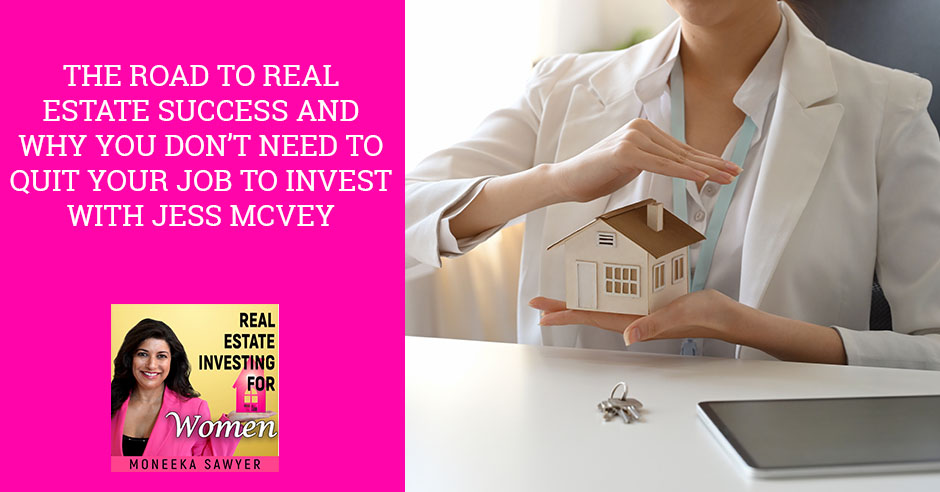
The road to real estate success isn’t always smooth. When we fall on our knees, it can be hard to get back up again sometimes. But the results can be rewarding if we learn from these experiences. In this episode, Jess McVey shares the ups and downs of her real estate story. Jess started buying rentals when she was young. And then she made mistakes when the market crashed. Although Jess started to back up a bit, that was not to be the end of her journey. Now, she has reached the success she worked hard for. Tune in to this inspiring episode and see how she was able to find success as a real estate investor. Plus, learn why keeping your job while doing real estate makes sense and why it might be the perfect advice for you!
—
Watch the episode here
Listen to the podcast here
The Road To Real Estate Success And Why You Don’t Need To Quit Your Job To Invest With Jess McVey – Real Estate Women
Real Estate Investing For Women
I am excited to welcome to the show Jess McVey. She is from Northwest Indiana. She started by buying rentals when she was in her early twenties and started flipping shortly thereafter. She made some mistakes when the 2007 and 2008 markets crashed. She took a break for about seven years and started back up, flipping in 2015. She started a wholesaling business in 2021. She’s done a lot of stuff. Welcome to this show.
Thank you for having me.
I’m delighted to have you. I want to let you know how I know Jess. I hope you’re going to talk a little bit about this. She was a student of Zack Boothe. When I asked Zack about his successful ladies and the people that he feels proud of, he mentioned Jess. I’m excited to talk to her all about what her journey has been. I know I read your bio, but could you give us a high-level story? What happened?
It all started when I was in college. I was good at school. I never felt right. I was doing well at a job that I had besides going to school. I was looking for something that was going to allow me to retire early. I was already thinking about retirement at nineteen. I know those kids don’t do that. Yeah. You were the rare exception.
I started investing in the stock market in 2000. The tech market dropped and I did badly in the stocks. I started looking at real estate. I started liking what I was reading. I could see myself doing it. I had more control over the investments. I called my dad. I said, “Dad, I’m coming home from college.” He’s like, “Why?” I’m like, “I want to buy rentals. I want to be a landlord?” He’s like, “You don’t know anything about fixing anything?” I’m like, “Yes, but I’ll learn.”
I came home. He helped me move home. Several months later, I bought my first property. After that, I bought eight in several years. As I learned, I took care of all those properties. I’ve managed all of them. I’ve rented them out, did the repairs, hired people if I had to, and I also started flipping. I did a couple of flips. Fast forward from 2006 to 2007, it started getting bad in the real estate market. People started seeing signs that there was going to be a collapse, and it did. I did make some mistakes but reiterated. A lot of people did. I should have been that hard on myself.
It was way more experience investors than me that lost everything they ever worked for in real estate. I had been doing a couple of years in Boston rentals and a couple of flips, but it was hard on myself. I backed away from it. I kept my properties. I hired a property manager. I went to Chicago and lived. I was 28 at the time, still passive investing, taking care of my properties, but I always wanted to get back into it. I was hard on myself, but I never forgot what I wanted to do.
In 2015, I had an opportunity to flip a house. I did it. I was my uncle’s neighbor. My uncle told me about it. I approached them. They let me buy the property. That set me off, and I did 2 or 3 a year because I still had a small child, a daughter. I wanted to be a full-time mom. She went to school in 2021 full-time. That’s when I took it up a notch.
I was doing 2 to 3 properties, flipping a couple of rentals, 15, 16, 17, 18, and 19, but as of 21, when I added wholesaling marketing, I did twenty. 20 April of 2020 until 20 April 2022, twenty deals. From April until May 2022, I had 10, but I had to cancel 2. I got eight in the pipeline at some point. Either I own them, I’m getting ready to close, or I’ve already closed them. It’s for 2 or 3 months. It’s pretty good.
First of all, I love that you started young, and I know we all can’t turn back time, but it makes my heart sing when I hear about young people that are in it. They’re thinking about their future. If you’re young, if you’re in your twenties, see what happens.
Don't give up after making big mistakes. Share on X
Don’t give up if you make a mistake. If I would’ve kept going, I would have been retired now. I’ve seven years of experience in doing and making, but still, I’d probably have instead of 24 doors, I probably have 48 or 50 units, 48 properties, or however you want to cash flow, more rentals, but I took a break.
There are experienced investors that lost everything in the crash in 2007 and 2008. Yeah. It’s interesting to me that you, like me did not. You held onto your properties, took some time off, and let them ride. That was good to hear. Why do you think that worked for you? For me, I always say that I wasn’t over-leveraged. It’s because rents went up, and I had a financial cushion. I was able to ride that wave that way. That was hard on people. What was it for you?
Why it worked out okay is because I did buy them net traditionally, I put 20% down. Most people agree with this. Even if you see market drops and maybe flipping doesn’t pan out, usually the rental market isn’t quite as affected. That’s not to say the pandemic didn’t work best with people’s rents. It was a whole different animal. For the most part, we have market downturns or recession rents. Still, people have to be able to live in a place. I wasn’t affected too much with the rental market. They were rentals, and they were cash flowing, breaking even.
Another thing is, which I never had to do is I do have a good job. If I ever had to, I could have put money into my rentals. I never had to until this day. I bought somebody at once that I could have stomp pay for other ones. If I have a $3,000, $4,000 bill, something big, I got the other ones to pay for it. That helped me and a good rental market. With the area I am in, Indiana, it’s not that place to stay rented. There’s a demand for it. It’s safe. There aren’t a lot of turnovers. That’s the reason it helped me get past all that turmoil that happened in the first few years of the recession.
I heard you say that you’re an employee.
Back then, when I had money, I was in bartending, managing bars, and was a yoga teacher. 2015, 16, 17, 18, 19, the pandemic. I could have made that a lot easier by saying the pandemic ended my yoga career because I didn’t want to teach online. I didn’t want to teach outside of the studio. A pandemic happened, and that’s why I stopped teaching yoga. When I did it, it was $100 a week. I was doing my real estate and my rentals, bringing cash flow in. I’ve owned them for a while. Rent has gone up. I lived off that too.
Now my business is I work for myself for gem house buyers. Before I did have, I was a yoga teacher for several years, and a bartender before that would allow me to have the funds to buy the properties in a traditional way. I didn’t know anything about creative financing, wholesaling, or seller financing. I didn’t know any of those all real estate stuff that people learn. I didn’t know that back. I put 20% down on all the properties because I had a good job, and I was 22. What else did I have to do with the money?
Many people have this aspiration. When I quit my job, I’m going to start investing in real estate. The best way to start is when you’ve got a job, and there are many reasons for this. It adds in anything that you might want to add. First of all, yes, there are lots of awesome creative financing ways to go. If you have no way of getting cash, that’s great.
The easiest way to get into real estate is to have a job, qualify for traditional financing, put 3.5% half to 20% down, whatever you can come up with, and based on the program that you choose, buy a house, house hack or rent it out. Primary residences are the easiest to finance and get into, and you need to pay rent anyways. It might as well pay yourself rather than somebody else’s mortgage. Utilize that money to get into the next house. Keep your job so that you can do it again. Until you’re big enough, maybe 1, 2, or 3 properties. You’ve got enough equity in one property that you can fold it back out.
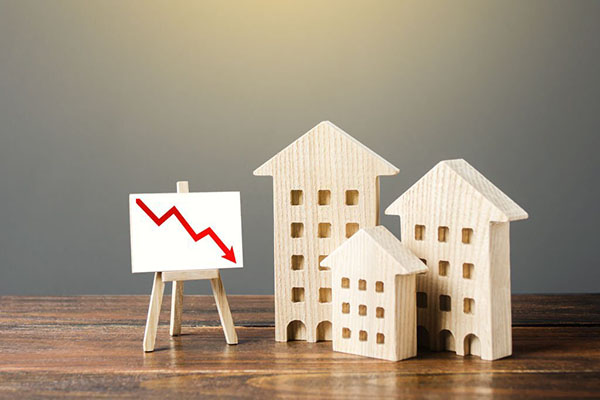
Real Estate Success: The rental market isn’t entirely as affected by market drops. When you have a market downturn or recession, people still have to live in a place.
Real estate does not have to be a full-time thing for me. I tell people all the time, “I work 5 to 10 hours a month on my real estate business. Now, it’s even less.” It’s not a full-time thing. Eventually, you can get to where you’re retiring. You’re working that little bit of time, whatever now most of your time is spent on what you would prefer to do. I love when you talk about, “I was working, and that’s how I got the money.” People forget that’s the easiest option out there. If things go wrong, you’ve still got your income. You’re still making money. I love that you modeled that. Thank you, Jess.
To add to that about you have a job, keep your job, and do real estate when you add that extra layer of, “I have to make money from this. I can’t survive.” You will not think properly. You won’t make a decision that is not as clean. You’re a little more desperate. Especially if you’re trying to learn real estate, you don’t even know about it.
I would hope nobody would be silly. I stopped. I’m doing what they’re doing, and they don’t know anything about real estate. Make sure you have that job, so you’re not working stressed out of that extra pressure of not succeeding. You have no job, and you’re surrendering trying to find a job. Nobody would be silly enough to stop unless they had a whole bunch of money. If you hit the lottery, I suppose you could quit your job but still do real estate.
If you win the lottery, make sure that you do real estate like that. Don’t spend them at. You invest it.
For most people, it’s cars, houses, and buying primary residences.
You’re like, “No, don’t do that.” I’m with you, shoes, purses, and clothes. Yes, you deserve all those blissful things and plan for the future. Your daughter went to school, and now you upgraded your business or up? What was the term you used?
I added another part of real estate investing. Although some people will say, “It’s not investing. It’s wholesaling.”
Talk about why you did that and how that transition happened?
I got tired of losing deals. That was why I started the wholesaling. I’ll back up and reiterate what that means. I was buying 2 to 3 properties in 2015. Maybe 2 or 3 in 2016. It’s easy to find those 2 or 3 properties. I bought some from some auctions and sheriff sales. I bought one from Auction.com and REOs. I’d got a couple of referrals.
Keep your job and do real estate. Stop doing what THEY'RE doing. Nobody would be silly enough to stop unless they had a whole bunch of money. Share on X
When I wanted to do more, my daughter was getting older, a little more independent, even a little bit before she went to school full time. I did 3 for 2 or 3 years. Now I want to do five. I was putting offers in and getting outbid all the time. Bigger companies probably have crews working for them, coming with their rehab costs lower than mine. It’s competitive.
I’m looking at wholesalers, emails, and MLS. For the last MLS in multiple listing services, I put an offer that was 53 offers. This was before it was hot. It was like 2018 or 19. I started thinking about wholesaling. I should back up. I did do two wholesale deals, one in 2017 and one in 2019. I have little marketing. I got the property. I was going to keep one as a rental. It occurred to me that I could wholesale it. It was great. I made $17,501 in one month. I didn’t know how to make it a business. I drove around a neighborhood, my neighborhood of rental properties. I was checking on them. I thought, “I’ll look around and see things for sale.” Low and behold, or was. I did that.
In 2019, I did send some letters out, mailers probably behind on their property taxes, and I got one from that. When you interview me, he is like, “Why didn’t you keep going?” I’m like, “I don’t know how to do it. I don’t know how to scale this.” In 2020, when I started watching YouTube, I found Zack. I liked him, and I signed up for his coaching. He filled the gaps in.
I got blessed because of several years of fixing rentals and learning how to flip. I know how to comp, do comparable properties, and do analysis to make sure it’s a deal. I was blessed that I knew that information. The wholesaling part was like, “This is how you find him. You call him. You send postcards. Do your marketing. He filled that in for me.” That’s how it all worked out for me. I hope that answers the question.
I want to add a couple of things. You say you were blessed because you already had this experience. You know how to mentally have an idea of what values are going to look like, what fix-ups are going to cost, and those sorts of things. Ladies, if you don’t have that experience, it doesn’t mean that you can’t do real estate. You have other blessings.
Let’s got to do a little bit more education first. It’s not hard to learn any of this. You don’t have to be a rocket scientist to learn how to go on Zillow and figure out what property sold in three months and how to decide. They look the same square footage. You’re not major calculations. You can learn the stuff in several months. It’s easy stuff.
When I started several years ago, there was none of this stuff. There are no Zillow, Trulia, and Redfin. We are lucky now that we have resources. I want to talk to you a little bit about Zack. You went through YouTube because this is a question that people ask me all the time. I want to find a mentor. I got on YouTube, and there are 50. You put in wholesaling and or whatever it is that you want to do, BRRRR, or whatever it is you want to do. A hundred people out there teaching about this strategy. How do I pick the mentor that’s got integrity, knows what he’s doing, and is going to help me build a successful business? How did you pick Zack?
I didn’t interview too many. I can tell you how I met Zack or how I decided to watch him on YouTube. There’s an app called DealMachine. It helps you add properties if you want to drive for dollars. He was on a podcast like an interview, and I liked him. I’ve checked him out on YouTube. I saw he had a video that said $40,000 in 40 days.
He did this challenge, and I watched all these. I liked him. He’s genuine. He’s not a big host. He’s doing well. When you look at his videos, he’s not huge. He’s not getting 1 million views. He’s small-time still. He’s going to be because he is genuine and authentic. I connected with him. I reached out to him, and we talked on the phone. It was affordable. He’s not overpriced on his coaching, at least at the level I picked. You might have something more maybe, but what he offered me, I was like, “That’s a great deal. Add to me.” I signed up for him, but he’s this easy-going, accessible guy. There’s something about how you connect with people.

Real Estate Success: Having a job qualified for traditional financing is the easiest way to get into real estate.
His real intention is to help people. That’s part of why I have you on. I’ve had several people on from his group because I feel that from him. I feel his heart. In every conversation that I’ve had with him, I feel deeply that his intention is to help. What is it that you loved most about working with him?
I still work with him. I texted him because I had a question about a property I had on a contract with a seller. It’s the first seller ever tried to walk out from a contract on me, all these deals I’ve done. The first ones that said, “I changed my mind.” I didn’t know how to handle that. I called Zack. He knows so much. If he doesn’t know it, if it’s technical, he’ll might say, “Miguel, one of his team members, knows.”
He knows a solution that I don’t think of. He’s always got all these different situations. He knows how to properly answer them for me. That’s why I like him. That’s why I keep reaching out to him if I need them. Sometimes I think I know more than I know. Sometimes I’m like, “I should probably have.” I have the ability to reach out to him more if I want. I don’t think to ask for help. I try to figure stuff out on my own, which sometimes isn’t the best. In this case, I knew I wasn’t figuring it out. I needed some assistance. He’s experienced. He’s done so many deals. That’s why I like him.
Is he super responsive?
We have group coaching calls, but if you have a deal on the line and you don’t know, he will call you back. He will make himself accessible to you. When it comes to actual questions about the course or a deal in the works, he’ll probably wait until the weekly coaching call. You can ask whatever questions you want. It’s 1 to 2 hours long. Sometimes, it’s been longer than two and a half hours. He will keep going until everyone answers. For the specific deals where you have something right there at the moment, he’ll make himself accessible.
That’s so rare, don’t you think?
Yes, I think so. Some coaches might be more expensive and not be as available
I have not taken Zack’s course because I’m not interested in wholesaling. I’m in retirement mode. I’m having fun. It’s important to me as we talk about him and I share about his coursework with my ladies that we’ve got some truthful, honest perspectives on what he has to offer. He’s a wholesaler. He loves it, and he loves teaching it from what I understand, but everybody I’ve spoken to. I’m glad to hear that. Tell me, Jess, what advice would you give to a new investor?
I would say the first is to get a mentor. I do believe you should have a coach. You could ask questions too. Yes, YouTube and books are great, but there’s a saying I have, “You don’t know what you don’t know.” How do you know what to learn first? If it’s basic real estate, you could find a mentor for that. If there is something specific, you want to learn, whether it’s wholesaling or you wanna be a real estate rental landlord. You want to have a huge portfolio. There’s a mentor for that.
Real estate does not have to be a full-time thing. Share on X
There’s a lot of free besides having a coach. BiggerPockets is good. There’s a lot of education on basic stuff but get an education. There’s another saying, “You’re going to get an education in real estate, whether you like it or not. You do it by making mistakes that are costly, or you do the education up front to help mitigate those mistakes.”Another piece of advice is if you do make a mistake, don’t give up. It works. Nobody’s successful. All the people that are successful that we know about in history usually made many mistakes and failures before they hit it. It sometimes takes years for that because you got to be patient.
Everything that you say, I agree with. Success can’t happen without failure. The only way to reach goals is to push yourself out of your comfort zone and what you already know. Otherwise, you stay stagnant in what you are and what you’re doing. When you’re pushing, you’re going to fail. When you were a baby and learning to walk, you didn’t go get up on your feet and start walking. Maybe some of you did, but most of us didn’t. You had to fall down a couple of times. Sometimes it hurt. You start crying.
We’re that same way. Every time we start something new, we have a new ambition or a new set of goals. We’re that same person. We’re not going to be, “I’m up.” You’ve got to learn. You’ve got to when you’re a baby. You’ve got mom standing there saying, “Come on.” Dad molded you on the other side or whatever. Those are your mentors in those days. That’s what you need, even in your businesses.
There are so many things, setting goals and making yourself accountable. I take videos. If people check me out, they’ll see. My video is on my personal page. I plan to put them on my business page, my Instagram. I’ll do videos. They’re live. There’s no script, or I’m going at it. I do that because it makes me accountable because I know people are watching. I’m like, “I got to make sure I do another one.”
That’s my way. That’s a little more high level. People reading could put something out there to people telling what they’re doing. They’re making themselves accountable. People ask them, “How’s it going?” You’re like, “Okay.” You won’t forget. People are reminding you, or you’re posting something on Facebook, and that’s what can be encouraging too. People will like it. This is a little social interaction to help encourage people to be accountable.
Normally, when I talk about accountability, I talk about it with group coaching or whatever. This was such a different perspective on accountability. I love that, Jess.
Thank you. Those videos are my accountability for myself.
Jess. You’ve been amazing. Thank you so much. Tell everybody how they can get in touch with you. I want to hear about your Facebook page, Instagram, and all that stuff. Let people know how they can reach you.
For my business page, Facebook and Instagram. You can reach out to me through my company or me. We’re both on as my personal, and that’s my name, Jesseme McVey. My actual business is Jemm House Buyers. Me, my daughter, and my husband’s initials. It’s also because I look for gems.

Real Estate Success: Ladies, if you don’t have experience, it doesn’t mean you can’t do real estate. You don’t have to be a rocket scientist to do it.
Ladies, you know that Jess is a student and friend of Zack Boothe, who we’ve heard from before. If you’re excited about learning what she learned from him, you can still connect with him and his team. Go to BlissfulInvestor.com/Zack. You’ll get to talk to him or Stephanie, who you’ve already met. They do have someone else who’s going to be working on the phones. I trust that that person will be as fabulous as them. You can go to that link and set up a time to chat with them and see if this business is a good fit for you. We saw what an amazing fit it’s been for Jess. If you’re interested in connecting with them, remember to go do that.
The show notes on the podcast players are, tend to be shorter and don’t always include the links. Go to BlissfulInvestor.com so that you can see the blog posts. That way, you can see all the links, all the gifts, all the connections, everything there for all my show. You can even do is search. My team will have Jess’s contact information and all the links. Do you have anything you want to close with Jess?
I think we did a pretty good job. We covered a lot. If you’re new to real estate investing, don’t give up. I always loved it. Whether you want to supplement your income, or if you want to do a full time, it could be very financially rewarding, and it gives you other rewards as well because you people work for yourself you can spend more time with your family, and you don’t have a boss and all that. Maybe you want it because you want to plan for your future.
To me, it’s the best investment of your time and money out there. They say 1% of the wealthiest people in the world, 90% of them own real estate of the 1% of the world the population. Ut’s a great vehicle to build wealth. Even passive or active investing wholesaling cash in your pocket when you do the deals, regardless of whatever you’re looking for. It’s awesome.
I always say, “There are a million ways to make $1 million in real estate.” You have to pick the strategy that fits best with what it is you’re trying to achieve.
Whatever you pick, if you’re diligent, you will be successful at it. You’ll make money at it. You’ll achieve your goals, whatever you decide to choose to do.
Thank you so much for sharing all this amazing wisdom with us.
No problem, anytime. Thank you for letting me share my story and give some advice to other investors out there. I appreciate it.
Thank you. It’s my pleasure. Ladies, thank you so much for joining Jess and I for this show. You know how much I appreciate you, and I look forward to seeing you next time. Until then, remember, “Goals without action are dreams.” Get out there, take action and create the life your heart deeply desires. I’ll see you soon.
Important Links
- Jess McVey
- Zack Boothe
- Auction.com
- YouTube – Zack Boothe
- DealMachine
- $40,000 in 40 days
- BiggerPockets
- Facebook – Jess McVey
- Instagram – Jess McVey
About Jess McVey
 We are professional home buyers, and we are proud to say that we’ve already helped many homeowners sell their homes! For us, the seller always comes first, and that means the deal has to work for both of us. Integrity and education are our principals, and they are the reason why we have the reputation we have today, as one of the most respected homebuyers around the area. We give you full support, and there are no gimmicks or hassling.
We are professional home buyers, and we are proud to say that we’ve already helped many homeowners sell their homes! For us, the seller always comes first, and that means the deal has to work for both of us. Integrity and education are our principals, and they are the reason why we have the reputation we have today, as one of the most respected homebuyers around the area. We give you full support, and there are no gimmicks or hassling.
We always work with fair offers and great prices, no matter the condition the homeowners are in!
NO financing is required because we have cash in hand to make the close even FASTER! We can close it all in just a week, but you can choose the actual closing date. We work on your terms!
——————————————————
To listen to the EXTRA portion of this show go to RealEstateInvestingForWomenExtra.com
Learn how to create a consistent income stream by only working 5 hours a month the Blissful Investor Way.
Grab my FREE guide at http://www.BlissfulInvestor.com
Moneeka Sawyer is often described as one of the most blissful people you will ever meet. She has been investing in Real Estate for over 20 years, so has been through all the different cycles of the market. Still, she has turned $10,000 into over $5,000,000, working only 5-10 hours per MONTH with very little stress.
While building her multi-million dollar business, she has traveled to over 55 countries, dances every single day, supports causes that are important to her, and spends lots of time with her husband of over 20 years.
She is the international best-selling author of the multiple award-winning books “Choose Bliss: The Power and Practice of Joy and Contentment” and “Real Estate Investing for Women: Expert Conversations to Increase Wealth and Happiness the Blissful Way.”
Moneeka has been featured on stages including Carnegie Hall and Nasdaq, radio, podcasts such as Achieve Your Goals with Hal Elrod, and TV stations including ABC, CBS, FOX, and the CW, impacting over 150 million people.
A Guide To Protecting Your House With Leading Property Inspection Expert John Cipres – Real Estate For Women

Property inspection is such a routine procedure that we often take it for granted. But no self-respecting homeowner, investor, buyer or broker would deny its importance in all real estate transactions. Just how important is property inspection and what does it entail? Today’s guest gives us the details. John Cipres is a certified property inspector, licensed general contractor, and C-36 license holder. He is a leading expert in his field and his clients have included real estate brokers, investors, homeowners and commercial companies. In this episode, John explains the major components of property inspection and why each of these components is essential. Join in and learn what things you should notice and when you should run as fast as you can!
—
Watch the episode here
Listen to the podcast here
A Guide To Protecting Your House With Leading Property Inspection Expert John Cipres – Real Estate For Women
Real Estate Investing For Women
I am so excited to introduce you to our guest, John Cipres. John worked for over sixteen years as a Field Customer Service Technician for Sempra Energy Gas Company. He left in 1997 to pursue his dream of owning and operating a business of his own. John is a certified property inspector and a licensed General B contractor. He holds a C-36 plumbing license. He is a leading expert in his field.
His clients include real estate brokers, investors, property management companies, homeowners as well as commercial companies i.e., Amtrak, LA Sports Arena, JPL, US Tile, and CP Kelco to name a few. John is also a certified life and business coach. He enjoys traveling in his spare time together with his wife, Laura, mentoring at-risk youth, and coaching young entrepreneurs.
—
Welcome to the show.
Thank you so much for having me.
This is so much fun. This is the first time I’ve done something live. I’m excited about this.
We’re going to have some fun.
First of all, tell us what are the major components of the property inspection.
There are five major components on any property. There’s a roof, foundation, electrical, plumbing, and heat and air conditioning. Those are the five major safeties. Run for the money if it’s not adequate for the house.
Those are the things people need to make sure that they get inspected. That’s why they hire you.
The other stuff is cosmetic things. Those are the major components of a house.
As a new home buyer, it’s very important to hire a home inspector because they would know what they’re looking at. Share on XTell us what are the fire, health, safety, and water hazards that exist on a property.
Smoke detectors are important. Carbon monoxide is important and stuff like that. If their heater is malfunctioning, it would be spewing carbon monoxide if it has a crack or stuff like that.
This whole carbon monoxide thing with the detectors is a new thing in the industry. We started requiring this a few years ago. All of us have heard about carbon monoxide. Tell us why they started doing this where you have to have a detector and what it causes for people in their homes.
The reason why they started having it is that there have been deaths equated to gas and unburned fumes on the property. It picks up carbon monoxide, which is odorless and tasteless. It’s a killer. After all these years, they have figured, “Let’s make it the law.” It saves lives. That’s the reason that they have it and had passed a law. System-wide, they have one in each property. The way the law is written is there’s one per floor. In other words, if you have two floors, you need one per floor.
Before we started, you mentioned something about the deep dive. You walk into a house, notice certain things, and run as fast as you can. Could you tell us a little bit more about that with regard to carbon monoxide?
Usually, the seller is required to put it on. If they don’t want to do it, then make sure they put it in because it is a requirement by law to have it on the property before you close escrow. If they don’t want to do it, then somebody has to do it. A lot of times, the agents will put it up. That’s one important thing because it does save lives.
What would you consider a minor or a major repair when you’re doing inspections?
A major repair would be an outdated electrical panel. If it’s way outdated, they would need to have a new panel, which includes the wiring. There’s some old wiring out there if they’re not grounded outlets and stuff like that. It’s a major expense to rewire a house and put a panel on. That’s something that the buyer should be aware of if they’re going to buy a property. They need to budget that money.

Property Inspection: There are five major components of property inspection: the roof, the foundation, electrical, plumbing, and air conditioning. These are the five major safety or run-for-the-money components.
How would they know?
They would call a home inspector like myself to come out and inspect all the major components of the property. We write up a report and get our reports out within 48 hours or sooner. Based on that report, since we’re a licensed contracting firm, if we’re asked, we will put a cost analysis on that report. That way, they know what it costs. They can do one of two things with that. They can ask them to repair it or they can get a credit for their escrow.
If I were walking into a home, how would I know if that’s something to keep my eyes on and think about?
If you go to the panel and you see that it’s old and it’s an original part of the house, it’s a red flag. Your inspector would catch that and then follow. There are some recalled panels out there. He would know if they’re recalled or not and then let you know, “This is way outdated. It should have been replaced many years ago. It’s new.” He would let them know right away. That would give peace of mind for him.
What is the average lifespan of water heaters and tankless water heaters? Talk a little bit about that because that’s a big issue.
The conventional water heaters on the property are usually 40 or 50 gallons. Their normal lifespan is between 8 to 12 years depending on how hard the water is in the area and if they flush it out once a year. That’s on conventional tank water heaters. It’s important to keep track of that. If a water heater is located upstairs in the hallway and they don’t catch it in time, then you have a big water damage issue when they go. We let them know by the rating plate how old the water heater is. If it’s at the end of its lifespan, we would let them know. We have run into water heaters that are 18 to 20 years old in the middle of the house. It’s a big urgency to get that replaced.
As a new buyer, is there any way for me to detect that walking into a house?
You would have to know what you’re looking at. That’s why it’s important to hire a property home inspector because they know what they’re looking at. They will say and write on the report the age of the water heater if it’s new and the risk factor if it’s low, medium, or high for leakage. They will put it on the report.
Team up with a contractor, property inspector, or somebody that you can go with and look at properties together. They can guide you and tell you if something’s a good deal. Share on XIs a seller responsible for that?
It’s all negotiated. It’s a real estate question. If the buyer says, “I would like the water heater replaced to help close a deal,” then it’s up to the seller to do that. The seller could say, “I’ll give you credit for that.” You can do it yourself.
We’re going to talk a little bit more about deep dives in the EXTRA portion of the show. Before that, why don’t you let my audience know how they can reach you?
They can reach me by going to our website. It’s www.AndreasFaultPro.com.
What stuff do you cover in the newsletter? What would they be getting from that?
There’s a lot of safety stuff. I’m known as the property inspector that saves lives. It would have a lot to do with safety on their property. A lot of homeowners are first-time homebuyers. They don’t know anything about a house. They can get educated along the way from the newsletter. Once a month, we will have some new information on there. They can look at it. It would be very beneficial.
That’s so valuable. I’m spending so much time maintaining. I can’t keep up with what’s going on. We don’t know where to look. If you’re sharing that information, that is valuable. I love that you said that you’re the home inspector that saves lives. Are you ready for our three rapid-fire questions? The first one is this. Give us one super tip on getting started in real estate investing.
From my perspective, one super tip is to team up with a contractor, a property inspector, or somebody that you can team up with and look at properties together. It would be a good tip because it’s like having that education on the house that they would normally have as an investor. That would be a good tip to include somebody, hire somebody, or team up with somebody who has some experience on properties. That way, they can guide them and say, “Is this a good deal? How much money are you going to spend on repairs?” We know that it’s all about the bottom line.

Property Inspection: A lot of homeowners are first time home buyers and they don’t know anything about a house, so they can get educated along the way from the newsletter.
That way, when you start walking in a house, you’ve already got that education. You can start eyeballing things and noticing things that you wouldn’t normally notice. Give us one strategy for being successful in real estate investing.
One strategy that I see is getting up early in the morning and making the best of your day 3 or 4 hours before people get up. Do your homework and don’t let the every day phone calls bother you when you can get so much done before your start time. Everybody starts usually at 7:00 or 8:00. I get up at 4:00 or 4:30 in the morning. I get stuff done when people are sleeping. When investing, that can be tied to doing your homework on the multiple listings or going out there. It’s first-come, first-served on properties. Whoever finds the deal first can put the offer in first. The early bird catches the worm.
It’s so funny because I don’t even get out of bed until 8:00 but I do that on the back end. Often, I’m working from 12:00 to 2:00. I still get my 6, 7, or 8 hours of sleep but I’m working in those quiet hours in the evening. It’s finding some time when you’re not going to be disturbed so you can focus. What is one daily practice that you would say contributes to your personal success?
Get up after you get hit. When you fall, get up. Keep on going after your dream and don’t let any negative talk or negative situation take you down. I always say, “Out of every negative situation, if you can find one good thing in that, that’s the golden nugget.”
We’re going to talk on EXTRA more about safety tips that John has to offer us. He has some stories for us. I love that he calls himself the home inspector that saves lives. We’re going to talk more about that in EXTRA but for now, we’re going to sign off. Thank you so much for joining us for this portion of the show. If you are subscribed to EXTRA, please stay tuned.
If you’re not but would like to be, go to RealEstateInvestingForWomenEXTRA.com. You can get signed up there. If you’re leaving us now, thank you so much for joining John and me for this portion of the show. I look forward to seeing you next time. Until then, remember that goals without action are dreams. Get out there, take action, and create the life your heart deeply desires. I’ll see you next time.
Important Links
——————————————————
To listen to the EXTRA portion of this show go to RealEstateInvestingForWomenExtra.com
Learn how to create a consistent income stream by only working 5 hours a month the Blissful Investor Way.
Grab my FREE guide at http://www.BlissfulInvestor.com
Moneeka Sawyer is often described as one of the most blissful people you will ever meet. She has been investing in Real Estate for over 20 years, so has been through all the different cycles of the market. Still, she has turned $10,000 into over $5,000,000, working only 5-10 hours per MONTH with very little stress.
While building her multi-million dollar business, she has traveled to over 55 countries, dances every single day, supports causes that are important to her, and spends lots of time with her husband of over 20 years.
She is the international best-selling author of the multiple award-winning books “Choose Bliss: The Power and Practice of Joy and Contentment” and “Real Estate Investing for Women: Expert Conversations to Increase Wealth and Happiness the Blissful Way.”
Moneeka has been featured on stages including Carnegie Hall and Nasdaq, radio, podcasts such as Achieve Your Goals with Hal Elrod, and TV stations including ABC, CBS, FOX, and the CW, impacting over 150 million people.


